 First Reading Zephaniah 3:14-18
First Reading Zephaniah 3:14-18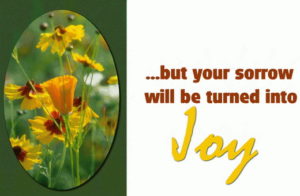 First Reading Acts 18:1-8
First Reading Acts 18:1-8Paul left Athens and went to Corinth, where he met a Jew called Aquila whose family came from Pontus. He and his wife Priscilla had recently left Italy because an edict of Claudius had expelled all the Jews from Rome. Paul went to visit them, and when he found they were tentmakers, of the same trade as himself, he lodged with them, and they worked together. Every sabbath he used to hold debates in the synagogues, trying to convert Jews as well as Greeks.
Jesus said to his disciples: ‘In a short time you will no longer see me, and then a short time later you will see me again.’ Then some of his disciples said to one another, ‘What does he mean, “In a short time you will no longer see me, and then a short time later you will see me again” and, “I am going to the Father”? What is this “short time”? We do not know what he means.’ Jesus knew that they wanted to question him, so he said, ‘You are asking one another what I meant by saying: In a short time you will no longer see me, and then a short time later you will see me again. ‘I tell you most solemnly, you will be weeping and wailing while the world will rejoice; you will be sorrowful, but your sorrow will turn to joy.’
 First Reading Acts 17:15,22-18:1
First Reading Acts 17:15,22-18:1 First Reading Acts 16:22-34
First Reading Acts 16:22-34The crowd joined in and showed their hostility to Paul and Silas, so the magistrates had them stripped and ordered them to be flogged. They were given many lashes and then thrown into prison, and the gaoler was told to keep a close watch on them. So, following his instructions, he threw them into the inner prison and fastened their feet in the stocks.
Jesus said to his disciples: ‘Now I am going to the one who sent me. Not one of you has asked, “Where are you going?” Yet you are sad at heart because I have told you this. Still, I must tell you the truth: it is for your own good that I am going because unless I go, the Advocate will not come to you; but if I do go, I will send him to you. And when he comes, he will show the world how wrong it was, about sin, and about who was in the right, and about judgement: about sin: proved by their refusal to believe in me; about who was in the right: proved by my going to the Father and your seeing me no more; about judgement: proved by the prince of this world being already condemned.’
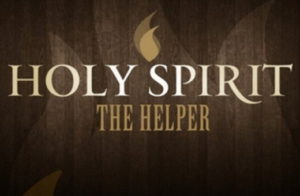 First Reading Acts 16:11-15
First Reading Acts 16:11-15Jesus said to his disciples: ‘When the Advocate comes, whom I shall send to you from the Father, the Spirit of truth who issues from the Father, he will be my witness. And you too will be witnesses, because you have been with me from the outset. ‘I have told you all this that your faith may not be shaken. They will expel you from the synagogues, and indeed the hour is coming when anyone who kills you will think he is doing a holy duty for God. They will do these things because they have never known either the Father or myself. But I have told you all this, so that when the time for it comes you may remember that I told you.’
 First Reading Acts 15:1-2,22-29
First Reading Acts 15:1-2,22-29Some men came down from Judaea and taught the brothers, ‘Unless you have yourselves circumcised in the tradition of Moses you cannot be saved.’ This led to disagreement, and after Paul and Barnabas had had a long argument with these men it was arranged that Paul and Barnabas and others of the church should go up to Jerusalem and discuss the problem with the apostles and elders. Then the apostles and elders decided to choose delegates to send to Antioch with Paul and Barnabas; the whole church concurred with this. They chose Judas known as Barsabbas and Silas, both leading men in the brotherhood, and gave them this letter to take with them:
In the spirit, the angel took me to the top of an enormous high mountain and showed me Jerusalem, the holy city, coming down from God out of heaven. It had all the radiant glory of God and glittered like some precious jewel of crystal-clear diamond. The walls of it were of a great height, and had twelve gates; at each of the twelve gates there was an angel, and over the gates were written the names of the twelve tribes of Israel; on the east there were three gates, on the north three gates, on the south three gates, and on the west three gates. The city walls stood on twelve foundation stones, each one of which bore the name of one of the twelve apostles of the Lamb.
Jesus said to his disciples: ‘If anyone loves me he will keep my word, and my Father will love him, and we shall come to him and make our home with him. Those who do not love me do not keep my words. And my word is not my own: it is the word of the one who sent me. I have said these things to you while still with you; but the Advocate, the Holy Spirit, whom the Father will send in my name, will teach you everything and remind you of all I have said to you. Peace I bequeath to you, my own peace I give you, a peace the world cannot give, this is my gift to you. Do not let your hearts be troubled or afraid. You heard me say: I am going away, and shall return. If you loved me you would have been glad to know that I am going to the Father, for the Father is greater than I. I have told you this now before it happens, so that when it does happen you may believe.’
 First Reading Acts 16:1-10
First Reading Acts 16:1-10From Cilicia Paul went to Derbe, and then on to Lystra. Here there was a disciple called Timothy, whose mother was a Jewess who had become a believer; but his father was a Greek. The brothers at Lystra and Iconium spoke well of Timothy, and Paul, who wanted to have him as a travelling companion, had him circumcised. This was on account of the Jews in the locality where everyone knew his father was a Greek. As they visited one town after another, they passed on the decisions reached by the apostles and elders in Jerusalem, with instructions to respect them. So the churches grew strong in the faith, as well as growing daily in numbers. They travelled through Phrygia and the Galatian country, having been told by the Holy Spirit not to preach the word in Asia. When they reached the frontier of Mysia they thought to cross it into Bithynia, but as the Spirit of Jesus would not allow them, they went through Mysia and came down to Troas.
Jesus said to his disciples: ‘If the world hates you, remember that it hated me before you. If you belonged to the world, the world would love you as its own; but because you do not belong to the world, because my choice withdrew you from the world, therefore the world hates you. Remember the words I said to you: A servant is not greater than his master. If they persecuted me, they will persecute you too; if they kept my word, they will keep yours as well. But it will be on my account that they will do all this, because they do not know the one who sent me.’
 First Reading Act 15:21-31
First Reading Act 15:21-31and disturbed your peace of mind, we have with one accord decided to choose representatives and to send them to you along with our beloved Barnabas and Paul, who have dedicated their lives to the name of our Lord Jesus Christ.
So we are sending Judas and Silas who will also convey this same message by word of mouth: ‘It is the decision of the Holy Spirit and of us not to place on you any burden beyond these necessities, namely, to abstain from meat sacrificed to idols, from blood, from meats of strangled animals, and from unlawful marriage. If you keep free of these, you will be doing what is right. Farewell.'” And so they were sent on their journey. Upon their arrival in Antioch they called the assembly together and delivered the letter. When the people read it, they were delighted with the exhortation.
Jesus said to his disciples: “This is my commandment: love one another as I love you. No one has greater love than this, to lay down one’s life for one’s friends. You are my friends if you do what I command you. I no longer call you slaves, because a slave does not know what his master is doing. I have called you friends, because I have told you everything I have heard from my Father. It was not you who chose me, but I who chose you and appointed you to go and bear fruit that will remain, so that whatever you ask the Father in my name he may give you. This I command you: love one another.”
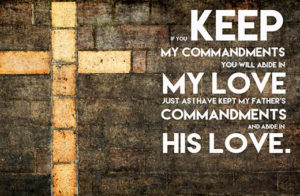 First Reading Acts 15:7-21
First Reading Acts 15:7-21After the discussion had gone on a long time, Peter stood up and addressed the apostles and the elders. ‘My brothers,’ he said ‘you know perfectly well that in the early days God made his choice among you: the pagans were to learn the Good News from me and so become believers. In fact God, who can read everyone’s heart, showed his approval of them by giving the Holy Spirit to them just as he had to us. God made no distinction between them and us, since he purified their hearts by faith. It would only provoke God’s anger now, surely, if you imposed on the disciples the very burden that neither we nor our ancestors were strong enough to support? Remember, we believe that we are saved in the same way as they are: through the grace of the Lord Jesus.’ This silenced the entire assembly, and they listened to Barnabas and Paul describing the signs and wonders God had worked through them among the pagans. When they had finished it was James who spoke. ‘My brothers,’ he said ‘listen to me. Simeon has described how God first arranged to enlist a people for his name out of the pagans. This is entirely in harmony with the words of the prophets, since the scriptures say: After that I shall return and rebuild the fallen House of David; I shall rebuild it from its ruins and restore it. Then the rest of mankind, all the pagans who are consecrated to my name, will look for the Lord, says the Lord who made this known so long ago.
Jesus said to his disciples: ‘As the Father has loved me, so I have loved you. Remain in my love. If you keep my commandments you will remain in my love, just as I have kept my Father’s commandments and remain in his love. I have told you this so that my own joy may be in you and your joy be complete.’
 First Reading Acts 15:1-6
First Reading Acts 15:1-6Some men came down from Judaea and taught the brothers, ‘Unless you have yourselves circumcised in the tradition of Moses you cannot be saved.’ This led to disagreement, and after Paul and Barnabas had had a long argument with these men it was arranged that Paul and Barnabas and others of the church should go up to Jerusalem and discuss the problem with the apostles and elders. All the members of the church saw them off, and as they passed through Phoenicia and Samaria they told how the pagans had been converted, and this news was received with the greatest satisfaction by the brothers. When they arrived in Jerusalem they were welcomed by the church and by the apostles and elders, and gave an account of all that God had done with them.
Jesus said to his disciples: ‘I am the true vine, and my Father is the vinedresser. Every branch in me that bears no fruit he cuts away, and every branch that does bear fruit he prunes to make it bear even more. You are pruned already, by means of the word that I have spoken to you. Make your home in me, as I make mine in you. As a branch cannot bear fruit all by itself, but must remain part of the vine, neither can you unless you remain in me. I am the vine, you are the branches. Whoever remains in me, with me in him, bears fruit in plenty; for cut off from me you can do nothing. Anyone who does not remain in me is like a branch that has been thrown away – he withers; these branches are collected and thrown on the fire, and they are burnt. If you remain in me and my words remain in you, you may ask what you will and you shall get it. It is to the glory of my Father that you should bear much fruit, and then you will be my disciples.’
 First Reading Acts 14:19-28
First Reading Acts 14:19-28 First Reading Acts 14:5-18
First Reading Acts 14:5-18 First Reading Acts 14:21-27
First Reading Acts 14:21-27Paul and Barnabas went back through Lystra and Iconium to Antioch. They put fresh heart into the disciples, encouraging them to persevere in the faith. ‘We all have to experience many hardships’ they said ‘before we enter the kingdom of God.’ In each of these churches they appointed elders, and with prayer and fasting they commended them to the Lord in whom they had come to believe. They passed through Pisidia and reached Pamphylia. Then after proclaiming the word at Perga they went down to Attalia and from there sailed for Antioch, where they had originally been commended to the grace of God for the work they had now completed.
I, John, saw a new heaven and a new earth; the first heaven and the first earth had disappeared now, and there was no longer any sea. I saw the holy city, and the new Jerusalem, coming down from God out of heaven, as beautiful as a bride all dressed for her husband. Then I heard a loud voice call from the throne, ‘You see this city? Here God lives among men. He will make his home among them; they shall be his people, and he will be their God; his name is God-with-them. He will wipe away all tears from their eyes; there will be no more death, and no more mourning or sadness. The world of the past has gone.’
When Judas had gone Jesus said: ‘Now has the Son of Man been glorified, and in him God has been glorified. If God has been glorified in him, God will in turn glorify him in himself, and will glorify him very soon. ‘My little children, I shall not be with you much longer. I give you a new commandment: love one another; just as I have loved you, you also must love one another. By this love you have for one another, everyone will know that you are my disciples.’
 First Reading Acts 13:44-52
First Reading Acts 13:44-52The next sabbath almost the whole town assembled to hear the word of God. When they saw the crowds, the Jews, prompted by jealousy, used blasphemies and contradicted everything Paul said. Then Paul and Barnabas spoke out boldly. ‘We had to proclaim the word of God to you first, but since you have rejected it, since you do not think yourselves worthy of eternal life, we must turn to the pagans. For this is what the Lord commanded us to do when he said: I have made you a light for the nations, so that my salvation may reach the ends of the earth.’ It made the pagans very happy to hear this and they thanked the Lord for his message; all who were destined for eternal life became believers. Thus the word of the Lord spread through the whole countryside.
Jesus said to his disciples: ‘If you know me, you know my Father too. From this moment you know him and have seen him.’ Philip said, ‘Lord, let us see the Father and then we shall be satisfied.’ ‘Have I been with you all this time, Philip,’ said Jesus to him, ‘and you still do not know me? ‘To have seen me is to have seen the Father, so how can you say, “Let us see the Father”? Do you not believe that I am in the Father and the Father is in me? The words I say to you I do not speak as from myself: it is the Father, living in me, who is doing this work. You must believe me when I say that I am in the Father and the Father is in me; believe it on the evidence of this work, if for no other reason. I tell you most solemnly, whoever believes in me will perform the same works as I do myself, he will perform even greater works, because I am going to the Father. Whatever you ask for in my name I will do, so that the Father may be glorified in the Son. If you ask for anything in my name, I will do it.’
 First Reading Acts 13:26-33
First Reading Acts 13:26-33Paul stood up in the synagogue at Antioch in Pisidia, held up a hand for silence and began to speak: ‘My brothers, sons of Abraham’s race, and all you who fear God, this message of salvation is meant for you. What the people of Jerusalem and their rulers did, though they did not realise it, was in fact to fulfil the prophecies read on every sabbath. Though they found nothing to justify his death, they condemned him and asked Pilate to have him executed. When they had carried out everything that scripture foretells about him they took him down from the tree and buried him in a tomb. But God raised him from the dead, and for many days he appeared to those who had accompanied him from Galilee to Jerusalem: and it is these same companions of his who are now his witnesses before our people.
Jesus said to his disciples: ‘Do not let your hearts be troubled. Trust in God still, and trust in me. There are many rooms in my Father’s house; if there were not, I should have told you. I am going now to prepare a place for you, and after I have gone and prepared you a place, I shall return to take you with me; so that where I am you may be too. You know the way to the place where I am going.’ Thomas said, ‘Lord, we do not know where you are going, so how can we know the way?’ Jesus said: ‘I am the Way, the Truth and the Life. No one can come to the Father except through me.’
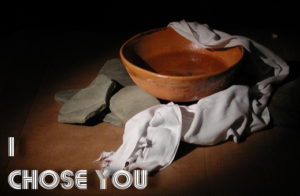 First Reading Acts 13:13-25
First Reading Acts 13:13-25Paul and his friends went by sea from Paphos to Perga in Pamphylia where John left them to go back to Jerusalem. The others carried on from Perga till they reached Antioch in Pisidia. Here they went to synagogue on the sabbath and took their seats. After the lessons from the Law and the Prophets had been read, the presidents of the synagogue sent them a message: ‘Brothers, if you would like to address some words of encouragement to the congregation, please do so.’ Paul stood up, held up a hand for silence and began to speak:
After he had washed the feet of his disciples, Jesus said to them: ‘I tell you most solemnly, no servant is greater than his master, no messenger is greater than the man who sent him. ‘Now that you know this, happiness will be yours if you behave accordingly. I am not speaking about all of you: I know the ones I have chosen; but what scripture says must be fulfilled: Someone who shares my table rebels against me. ‘I tell you this now, before it happens, so that when it does happen you may believe that I am He. I tell you most solemnly, whoever welcomes the one I send welcomes me, and whoever welcomes me welcomes the one who sent me.’
The word of God continued to spread and to gain followers. Barnabas and Saul completed their task and came back from Jerusalem, bringing John Mark with them. In the church at Antioch the following were prophets and teachers: Barnabas, Simeon called Niger, and Lucius of Cyrene, Manaen, who had been brought up with Herod the tetrarch, and Saul. One day while they were offering worship to the Lord and keeping a fast, the Holy Spirit said, ‘I want Barnabas and Saul set apart for the work to which I have called them.’ So it was that after fasting and prayer they laid their hands on them and sent them off.
Jesus declared publicly: ‘Whoever believes in me believes not in me but in the one who sent me, and whoever sees me, sees the one who sent me. I, the light, have come into the world, so that whoever believes in me need not stay in the dark any more. If anyone hears my words and does not keep them faithfully, it is not I who shall condemn him, since I have come not to condemn the world, but to save the world. He who rejects me and refuses my words has his judge already: the word itself that I have spoken will be his judge on the last day. For what I have spoken does not come from myself; no, what I was to say, what I had to speak, was commanded by the Father who sent me, and I know that his commands mean eternal life. And therefore what the Father has told me is what I speak.’
 First Reading Acts 1:15-17,20-26
First Reading Acts 1:15-17,20-26One day Peter stood up to speak to the brothers – there were about a hundred and twenty persons in the congregation: ‘Brothers, the passage of scripture had to be fulfilled in which the Holy Spirit, speaking through David, foretells the fate of Judas, who offered himself as a guide to the men who arrested Jesus – after having been one of our number and actually sharing this ministry of ours. Now in the Book of Psalms it says: Let his camp be reduced to ruin, Let there be no one to live in it. And again: Let someone else take his office. ‘We must therefore choose someone who has been with us the whole time that the Lord Jesus was travelling round with us, someone who was with us right from the time when John was baptising until the day when he was taken up from us – and he can act with us as a witness to his resurrection.’
Jesus said to his disciples: ‘As the Father has loved me, so I have loved you. Remain in my love. If you keep my commandments you will remain in my love, just as I have kept my Father’s commandments and remain in his love. I have told you this so that my own joy may be in you and your joy be complete. This is my commandment: love one another, as I have loved you. A man can have no greater love than to lay down his life for his friends. You are my friends, if you do what I command you. I shall not call you servants any more, because a servant does not know his master’s business; I call you friends, because I have made known to you everything I have learnt from my Father. You did not choose me: no, I chose you; and I commissioned you to go out and to bear fruit, fruit that will last; and then the Father will give you anything you ask him in my name. What I command you is to love one another.’
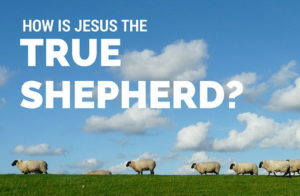 First Reading Acts 11:1-18
First Reading Acts 11:1-18The apostles and the brothers in Judaea heard that the pagans too had accepted the word of God, and when Peter came up to Jerusalem the Jews criticised him and said, ‘So you have been visiting the uncircumcised and eating with them, have you?’ Peter in reply gave them the details point by point: ‘One day, when I was in the town of Jaffa,’ he began ‘I fell into a trance as I was praying and had a vision of something like a big sheet being let down from heaven by its four corners. This sheet reached the ground quite close to me. I watched it intently and saw all sorts of animals and wild beasts – everything possible that could walk, crawl or fly. Then I heard a voice that said to me, “Now, Peter; kill and eat!” But I answered: Certainly not, Lord; nothing profane or unclean has ever crossed my lips. And a second time the voice spoke from heaven, “What God has made clean, you have no right to call profane.” This was repeated three times, before the whole of it was drawn up to heaven again. ‘Just at that moment, three men stopped outside the house where we were staying; they had been sent from Caesarea to fetch me, and the Spirit told me to have no hesitation about going back with them. The six brothers here came with me as well, and we entered the man’s house. He told us he had seen an angel standing in his house who said, “Send to Jaffa and fetch Simon known as Peter; he has a message for you that will save you and your entire household.” ‘I had scarcely begun to speak when the Holy Spirit came down on them in the same way as it came on us at the beginning, and I remembered that the Lord had said, “John baptised with water, but you will be baptised with the Holy Spirit.” I realised then that God was giving them the identical thing he gave to us when we believed in the Lord Jesus Christ; and who was I to stand in God’s way?’
Jesus said: ‘I tell you most solemnly, anyone who does not enter the sheepfold through the gate, but gets in some other way is a thief and a brigand. The one who enters through the gate is the shepherd of the flock; the gatekeeper lets him in, the sheep hear his voice, one by one he calls his own sheep and leads them out. When he has brought out his flock, he goes ahead of them, and the sheep follow because they know his voice. They never follow a stranger but run away from him: they do not recognise the voice of strangers.’ Jesus told them this parable but they failed to understand what he meant by telling it to them. So Jesus spoke to them again: ‘I tell you most solemnly, I am the gate of the sheepfold. All others who have come are thieves and brigands; but the sheep took no notice of them. I am the gate. Anyone who enters through me will be safe: he will go freely in and out and be sure of finding pasture. The thief comes only to steal and kill and destroy. I have come so that they may have life and have it to the full.’
 First Reading Acts 13:14,43-52
First Reading Acts 13:14,43-52Paul and Barnabas carried on from Perga till they reached Antioch in Pisidia. Here they went to synagogue on the Sabbath and took their seats. When the meeting broke up many Jews and devout converts joined Paul and Barnabas, and in their talks with them Paul and Barnabas urged them to remain faithful to the grace God had given them. The next sabbath almost the whole town assembled to hear the word of God. When they saw the crowds, the Jews, prompted by jealousy, used blasphemies and contradicted everything Paul said. Then Paul and Barnabas spoke out boldly. ‘We had to proclaim the word of God to you first, but since you have rejected it, since you do not think yourselves worthy of eternal life, we must turn to the pagans. For this is what the Lord commanded us to do when he said: I have made you a light for the nations, so that my salvation may reach the ends of the earth.’ It made the pagans very happy to hear this and they thanked the Lord for his message; all who were destined for eternal life became believers. Thus the word of the Lord spread through the whole countryside.
Jesus said: ‘The sheep that belong to me listen to my voice; I know them and they follow me. I give them eternal life; they will never be lost and no one will ever steal them from me. The Father who gave them to me is greater than anyone, and no one can steal from the Father. The Father and I are one.’
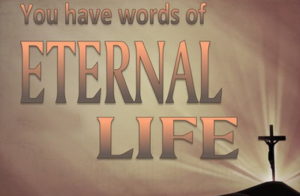 First Reading Acts 9:31-42
First Reading Acts 9:31-42The churches throughout Judaea, Galilee and Samaria were now left in peace, building themselves up, living in the fear of the Lord, and filled with the consolation of the Holy Spirit. Peter visited one place after another and eventually came to the saints living down in Lydda. There he found a man called Aeneas, a paralytic who had been bedridden for eight years. Peter said to him, ‘Aeneas, Jesus Christ cures you: get up and fold up your sleeping mat.’ Aeneas got up immediately; everybody who lived in Lydda and Sharon saw him, and they were all converted to the Lord. At Jaffa there was a woman disciple called Tabitha, or Dorcas in Greek, who never tired of doing good or giving in charity. But the time came when she got ill and died, and they washed her and laid her out in a room upstairs. Lydda is not far from Jaffa, so when the disciples heard that Peter was there, they sent two men with an urgent message for him, ‘Come and visit us as soon as possible.’
After hearing his doctrine many of the followers of Jesus said, ‘This is intolerable language. How could anyone accept it?’ Jesus was aware that his followers were complaining about it and said, ‘Does this upset you? What if you should see the Son of Man ascend to where he was before? ‘It is the spirit that gives life, the flesh has nothing to offer. The words I have spoken to you are spirit and they are life. ‘But there are some of you who do not believe.’ For Jesus knew from the outset those who did not believe, and who it was that would betray him. He went on, ‘This is why I told you that no one could come to me unless the Father allows him.’ After this, many of his disciples left him and stopped going with him. Then Jesus said to the Twelve, ‘What about you, do you want to go away too?’ Simon Peter answered, ‘Lord, who shall we go to? You have the message of eternal life, and we believe; we know that you are the Holy One of God.’
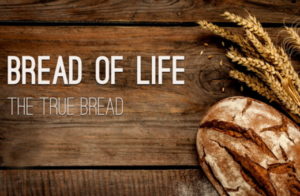 First Reading Acts 9:1-20
First Reading Acts 9:1-20Saul was still breathing threats to slaughter the Lord’s disciples. He had gone to the high priest and asked for letters addressed to the synagogues in Damascus, that would authorise him to arrest and take to Jerusalem any followers of the Way, men or women, that he could find. Suddenly, while he was travelling to Damascus and just before he reached the city, there came a light from heaven all round him. He fell to the ground, and then he heard a voice saying, ‘Saul, Saul, why are you persecuting me?’ ‘Who are you, Lord?’ he asked, and the voice answered, ‘I am Jesus, and you are persecuting me. Get up now and go into the city, and you will be told what you have to do.’ The men travelling with Saul stood there speechless, for though they heard the voice they could see no one. Saul got up from the ground, but even with his eyes wide open he could see nothing at all, and they had to lead him into Damascus by the hand. For three days he was without his sight, and took neither food nor drink. A disciple called Ananias who lived in Damascus had a vision in which he heard the Lord say to him, ‘Ananias!’ When he replied, ‘Here I am, Lord’, the Lord said, ‘You must go to Straight Street and ask the house of Judas for someone called Saul, who comes from Tarsus. At this moment he is praying, having had a vision of a man called Ananias coming in and laying hands on him to give him back his sight.’ When he heard that, Ananias said, ‘Lord, several people have told me about this man and all the harm he has been doing to your saints in Jerusalem. He has only come here because he holds a warrant from the chief priests to arrest everybody who invokes your name.’ The Lord replied, ‘You must go all the same, because this man is my chosen instrument to bring my name before pagans and pagan kings and before the people of Israel; I myself will show him how much he himself must suffer for my name.’ Then Ananias went. He entered the house, and at once laid his hands on Saul and said, ‘Brother Saul, I have been sent by the Lord Jesus who appeared to you on your way here so that you may recover your sight and be filled with the Holy Spirit.’ Immediately it was as though scales fell away from Saul’s eyes and he could see again. So he was baptised there and then, and after taking some food he regained his strength.
The Jews started arguing with one another: ‘How can this man give us his flesh to eat?’ they said. Jesus replied: ‘I tell you most solemnly, if you do not eat the flesh of the Son of Man and drink his blood, you will not have life in you. Anyone who does eat my flesh and drink my blood has eternal life, and I shall raise him up on the last day. For my flesh is real food and my blood is real drink. He who eats my flesh and drinks my blood lives in me and I live in him. As I, who am sent by the living Father, myself draw life from the Father, so whoever eats me will draw life from me. This is the bread come down from heaven; not like the bread our ancestors ate: they are dead, but anyone who eats this bread will live for ever.’ He taught this doctrine at Capernaum, in the synagogue.
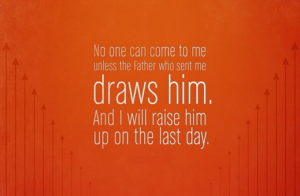 First Reading Acts 8:26-40
First Reading Acts 8:26-40he angel of the Lord spoke to Philip saying, ‘Be ready to set out at noon along the road that goes from Jerusalem down to Gaza, the desert road.’ So he set off on his journey. Now it happened that an Ethiopian had been on pilgrimage to Jerusalem; he was a eunuch and an officer at the court of the kandake, or queen, of Ethiopia, and was in fact her chief treasurer. He was now on his way home; and as he sat in his chariot he was reading the prophet Isaiah. The Spirit said to Philip, ‘Go up and meet that chariot.’ When Philip ran up, he heard him reading Isaiah the prophet and asked, ‘Do you understand what you are reading?’ ‘How can I’ he replied ‘unless I have someone to guide me?’ So he invited Philip to get in and sit by his side. Now the passage of scripture he was reading was this: Like a sheep that is led to the slaughter-house, like a lamb that is dumb in front of its shearers, like these he never opens his mouth. He has been humiliated and has no one to defend him. Who will ever talk about his descendants, since his life on earth has been cut short! The eunuch turned to Philip and said, ‘Tell me, is the prophet referring to himself or someone else?’ Starting, therefore, with this text of scripture Philip proceeded to explain the Good News of Jesus to him.
Jesus said to the crowd: ‘No one can come to me unless he is drawn by the Father who sent me, and I will raise him up at the last day. It is written in the prophets: They will all be taught by God, and to hear the teaching of the Father, and learn from it, is to come to me. Not that anybody has seen the Father, except the one who comes from God: he has seen the Father. I tell you most solemnly, everybody who believes has eternal life. ‘I am the bread of life. Your fathers ate the manna in the desert and they are dead; but this is the bread that comes down from heaven, so that a man may eat it and not die. I am the living bread which has come down from heaven. Anyone who eats this bread will live for ever; and the bread that I shall give is my flesh, for the life of the world.’
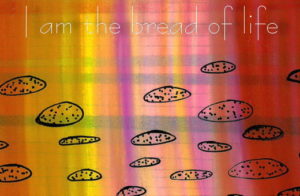 First Reading Acts 8:1-8
First Reading Acts 8:1-8That day a bitter persecution started against the church in Jerusalem, and everyone except the apostles fled to the country districts of Judaea and Samaria. There were some devout people, however, who buried Stephen and made great mourning for him. Saul then worked for the total destruction of the Church; he went from house to house arresting both men and women and sending them to prison.
Jesus said to the crowd: ‘I am the bread of life. He who comes to me will never be hungry; he who believes in me will never thirst. But, as I have told you, you can see me and still you do not believe. All that the Father gives me will come to me, and whoever comes to me I shall not turn him away; because I have come from heaven, not to do my own will, but to do the will of the one who sent me. Now the will of him who sent me is that I should lose nothing of all that he has given to me, and that I should raise it up on the last day. Yes, it is my Father’s will that whoever sees the Son and believes in him shall have eternal life, and that I shall raise him up on the last day.’
 First Reading Acts 7:51-8:1
First Reading Acts 7:51-8:1Stephen said to the people, the elders and the scribes: ‘You stubborn people, with your pagan hearts and pagan ears. You are always resisting the Holy Spirit, just as your ancestors used to do. Can you name a single prophet your ancestors never persecuted? In the past they killed those who foretold the coming of the Just One, and now you have become his betrayers, his murderers. You who had the Law brought to you by angels are the very ones who have not kept it.’ They were infuriated when they heard this, and ground their teeth at him.
The people said to Jesus, ‘What sign will you give to show us that we should believe in you? What work will you do? Our fathers had manna to eat in the desert; as scripture says: He gave them bread from heaven to eat.’ Jesus answered: ‘I tell you most solemnly, it was not Moses who gave you bread from heaven, it is my Father who gives you the bread from heaven, the true bread; for the bread of God is that which comes down from heaven and gives life to the world.’ ‘Sir,’ they said ‘give us that bread always.’ Jesus answered: ‘I am the bread of life. He who comes to me will never be hungry; he who believes in me will never thirst.’
 First Reading Acts 6:8-15
First Reading Acts 6:8-15After Jesus had fed the five thousand, his disciples saw him walking on the water. Next day, the crowd that had stayed on the other side saw that only one boat had been there, and that Jesus had not got into the boat with his disciples, but that the disciples had set off by themselves. Other boats, however, had put in from Tiberias, near the place where the bread had been eaten. When the people saw that neither Jesus nor his disciples were there, they got into those boats and crossed to Capernaum to look for Jesus. When they found him on the other side, they said to him, ‘Rabbi, when did you come here?’ Jesus answered: ‘I tell you most solemnly, you are not looking for me because you have seen the signs but because you had all the bread you wanted to eat. Do not work for food that cannot last, but work for food that endures to eternal life, the kind of food the Son of Man is offering you, for on him the Father, God himself, has set his seal.’ Then they said to him, ‘What must we do if we are to do the works that God wants?’ Jesus gave them this answer, ‘This is working for God: you must believe in the one he has sent.’
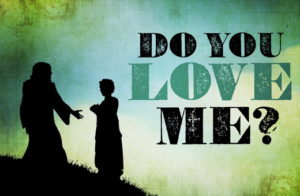 First Reading Acts 5:27-32,40-41
First Reading Acts 5:27-32,40-41Jesus showed himself again to the disciples. It was by the Sea of Tiberias, and it happened like this: Simon Peter, Thomas called the Twin, Nathanael from Cana in Galilee, the sons of Zebedee and two more of his disciples were together. Simon Peter said, ‘I’m going fishing.’ They replied, ‘We’ll come with you.’ They went out and got into the boat but caught nothing that night. It was light by now and there stood Jesus on the shore, though the disciples did not realise that it was Jesus. Jesus called out, ‘Have you caught anything, friends?’ And when they answered, ‘No’, he said, ‘Throw the net out to starboard and you’ll find something.’ So they dropped the net, and there were so many fish that they could not haul it in. The disciple Jesus loved said to Peter, ‘It is the Lord.’ At these words ‘It is the Lord’, Simon Peter, who had practically nothing on, wrapped his cloak round him and jumped into the water. The other disciples came on in the boat, towing the net and the fish; they were only about a hundred yards from land. As soon as they came ashore they saw that there was some bread there, and a charcoal fire with fish cooking on it. Jesus said, ‘Bring some of the fish you have just caught.’ Simon Peter went aboard and dragged the net to the shore, full of big fish, one hundred and fifty-three of them; and in spite of there being so many the net was not broken. Jesus said to them, ‘Come and have breakfast.’ None of the disciples was bold enough to ask, ‘Who are you?’; they knew quite well it was the Lord. Jesus then stepped forward, took the bread and gave it to them, and the same with the fish. This was the third time that Jesus showed himself to the disciples after rising from the dead. After the meal Jesus said to Simon Peter, ‘Simon son of John, do you love me more than these others do?’ He answered, ‘Yes Lord, you know I love you.’ Jesus said to him, ‘Feed my lambs.’ A second time he said to him, ‘Simon son of John, do you love me?’ He replied, ‘Yes, Lord, you know I love you.’ Jesus said to him, ‘Look after my sheep.’ Then he said to him a third time, ‘Simon son of John, do you love me?’ Peter was upset that he asked him the third time, ‘Do you love me?’ and said, ‘Lord, you know everything; you know I love you.’ Jesus said to him, ‘Feed my sheep. ‘I tell you most solemnly, when you were young you put on your own belt and walked where you liked; but when you grow old you will stretch out your hands, and somebody else will put a belt round you and take you where you would rather not go.’ In these words he indicated the kind of death by which Peter would give glory to God. After this he said, ‘Follow me.’
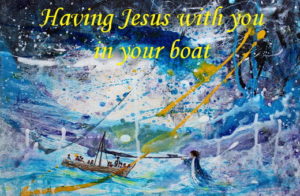 First Reading Acts 6:1-7
First Reading Acts 6:1-7About this time, when the number of disciples was increasing, the Hellenists made a complaint against the Hebrews: in the daily distribution their own widows were being overlooked. So the Twelve called a full meeting of the disciples and addressed them, ‘It would not be right for us to neglect the word of God so as to give out food; you, brothers, must select from among yourselves seven men of good reputation, filled with the Spirit and with wisdom; we will hand over this duty to them, and continue to devote ourselves to prayer and to the service of the word.’ The whole assembly approved of this proposal and elected Stephen, a man full of faith and of the Holy Spirit, together with Philip, Prochorus, Nicanor, Timon, Parmenas, and Nicolaus of Antioch, a convert to Judaism. They presented these to the apostles, who prayed and laid their hands on them.
In the evening the disciples went down to the shore of the lake and got into a boat to make for Capernaum on the other side of the lake. It was getting dark by now and Jesus had still not rejoined them. The wind was strong, and the sea was getting rough. They had rowed three or four miles when they saw Jesus walking on the lake and coming towards the boat. This frightened them, but he said, ‘It is I. Do not be afraid.’ They were for taking him into the boat, but in no time it reached the shore at the place they were making for.
 First Reading 1 Corinthians 15:1-8
First Reading 1 Corinthians 15:1-8Brothers, I want to remind you of the gospel I preached to you, the gospel that you received and in which you are firmly established; because the gospel will save you only if you keep believing exactly what I preached to you – believing anything else will not lead to anything.
Jesus said to Thomas: ‘I am the Way, the Truth and the Life. No one can come to the Father except through me. If you know me, you know my Father too. From this moment you know him and have seen him.’ Philip said, ‘Lord, let us see the Father and then we shall be satisfied.’ ‘Have I been with you all this time, Philip,’ said Jesus to him ‘and you still do not know me? ‘To have seen me is to have seen the Father, so how can you say, “Let us see the Father”? Do you not believe that I am in the Father and the Father is in me? The words I say to you I do not speak as from myself: it is the Father, living in me, who is doing this work. You must believe me when I say that I am in the Father and the Father is in me; believe it on the evidence of this work, if for no other reason. I tell you most solemnly, whoever believes in me will perform the same works as I do myself, he will perform even greater works, because I am going to the Father. Whatever you ask for in my name I will do, so that the Father may be glorified in the Son. If you ask for anything in my name, I will do it.’
 First Reading Acts 5:27-33
First Reading Acts 5:27-33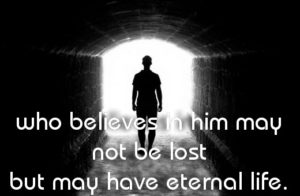 First Reading Acts 5:17-26
First Reading Acts 5:17-26The high priest intervened with all his supporters from the party of the Sadducees. Prompted by jealousy, they arrested the apostles and had them put in the common gaol. But at night the angel of the Lord opened the prison gates and said as he led them out, ‘Go and stand in the Temple, and tell the people all about this new Life.’ They did as they were told; they went into the Temple at dawn and began to preach.
Jesus said to Nicodemus: ‘God loved the world so much that he gave his only Son, so that everyone who believes in him may not be lost but may have eternal life. For God sent his Son into the world not to condemn the world, but so that through him the world might be saved. No one who believes in him will be condemned; but whoever refuses to believe is condemned already, because he has refused to believe in the name of God’s only Son. On these grounds is sentence pronounced: that though the light has come into the world men have shown they prefer darkness to the light because their deeds were evil. And indeed, everybody who does wrong hates the light and avoids it, for fear his actions should be exposed; but the man who lives by the truth comes out into the light, so that it may be plainly seen that what he does is done in God.’
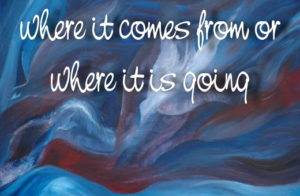 First Reading Acts 4:32-37
First Reading Acts 4:32-37The whole group of believers was united, heart and soul; no one claimed for his own use anything that he had, as everything they owned was held in common. The apostles continued to testify to the resurrection of the Lord Jesus with great power, and they were all given great respect. None of their members was ever in want, as all those who owned land or houses would sell them, and bring the money from them, to present it to the apostles; it was then distributed to any members who might be in need.
Jesus said to Nicodemus: ‘Do not be surprised when I say: You must be born from above. The wind blows wherever it pleases; you hear its sound, but you cannot tell where it comes from or where it is going. That is how it is with all who are born of the Spirit.’ ‘How can that be possible?’ asked Nicodemus. ‘You, a teacher in Israel, and you do not know these things!’ replied Jesus. ‘I tell you most solemnly, we speak only about what we know and witness only to what we have seen and yet you people reject our evidence. If you do not believe me when I speak about things in this world, how are you going to believe me when I speak to you about heavenly things? No one has gone up to heaven except the one who came down from heaven, the Son of Man who is in heaven; and the Son of Man must be lifted up as Moses lifted up the serpent in the desert, so that everyone who believes may have eternal life in him.’
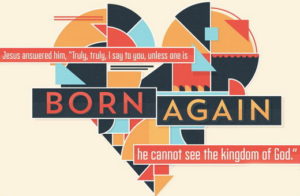 First Reading Acts 4:23-31
First Reading Acts 4:23-31As soon as Peter and John were released they went to the community and told them everything the chief priests and elders had said to them. When they heard it they lifted up their voice to God all together. ‘Master,’ they prayed ‘it is you who made heaven and earth and sea, and everything in them; you it is who said through the Holy Spirit and speaking through our ancestor David, your servant: Why this arrogance among the nations, these futile plots among the peoples? Kings on earth setting out to war, princes making an alliance, against the Lord and against his Anointed.
There was one of the Pharisees called Nicodemus, a leading Jew, who came to Jesus by night and said, ‘Rabbi, we know that you are a teacher who comes from God; for no one could perform the signs that you do unless God were with him.’ Jesus answered: ‘I tell you most solemnly, unless a man is born from above, he cannot see the kingdom of God.’ Nicodemus said, ‘How can a grown man be born? Can he go back into his mother’s womb and be born again?’ Jesus replied: ‘I tell you most solemnly, unless a man is born through water and the Spirit, he cannot enter the kingdom of God: what is born of the flesh is flesh; what is born of the Spirit is spirit. Do not be surprised when I say: You must be born from above. The wind blows wherever it pleases; you hear its sound, but you cannot tell where it comes from or where it is going. That is how it is with all who are born of the Spirit.’
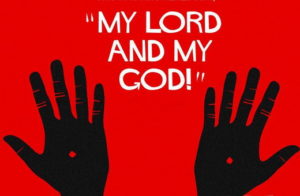 First Reading Acts 5:12-16
First Reading Acts 5:12-16My name is John, and through our union in Jesus I am your brother and share your sufferings, your kingdom, and all you endure. I was on the island of Patmos for having preached God’s word and witnessed for Jesus; it was the Lord’s day and the Spirit possessed me, and I heard a voice behind me, shouting like a trumpet, ‘Write down all that you see in a book.’ I turned round to see who had spoken to me, and when I turned I saw seven golden lamp-stands and, surrounded by them, a figure like a Son of man, dressed in a long robe tied at the waist with a golden girdle.
In the evening of that same day, the first day of the week, the doors were closed in the room where the disciples were, for fear of the Jews. Jesus came and stood among them. He said to them, ‘Peace be with you’, and showed them his hands and his side. The disciples were filled with joy when they saw the Lord, and he said to them again, ‘Peace be with you. ‘As the Father sent me, so am I sending you.’ After saying this he breathed on them and said: ‘Receive the Holy Spirit. For those whose sins you forgive, they are forgiven; for those whose sins you retain, they are retained.’ Thomas, called the Twin, who was one of the Twelve, was not with them when Jesus came. When the disciples said, ‘We have seen the Lord’, he answered, ‘Unless I see the holes that the nails made in his hands and can put my finger into the holes they made, and unless I can put my hand into his side, I refuse to believe.’ Eight days later the disciples were in the house again and Thomas was with them. The doors were closed, but Jesus came in and stood among them. ‘Peace be with you’ he said. Then he spoke to Thomas, ‘Put your finger here; look, here are my hands. Give me your hand; put it into my side. Doubt no longer but believe.’ Thomas replied, ‘My Lord and my God!’ Jesus said to him: ‘You believe because you can see me. Happy are those who have not seen and yet believe.’ There were many other signs that Jesus worked and the disciples saw, but they are not recorded in this book. These are recorded so that you may believe that Jesus is the Christ, the Son of God, and that believing this you may have life through his name.
 First Reading Acts 4:13-21
First Reading Acts 4:13-21The rulers, elders and scribes were astonished at the assurance shown by Peter and John, considering they were uneducated laymen; and they recognised them as associates of Jesus; but when they saw the man who had been cured standing by their side, they could find no answer. So they ordered them to stand outside while the Sanhedrin had a private discussion. ‘What are we going to do with these men?’ they asked. ‘It is obvious to everybody in Jerusalem that a miracle has been worked through them in public, and we cannot deny it. But to stop the whole thing spreading any further among the people, let us caution them never to speak to anyone in this name again.’
Having risen in the morning on the first day of the week, Jesus appeared first to Mary of Magdala from whom he had cast out seven devils. She then went to those who had been his companions, and who were mourning and in tears, and told them. But they did not believe her when they heard her say that he was alive and that she had seen him. After this, he showed himself under another form to two of them as they were on their way into the country. These went back and told the others, who did not believe them either. Lastly, he showed himself to the Eleven themselves while they were at table. He reproached them for their incredulity and obstinacy, because they had refused to believe those who had seen him after he had risen. And he said to them, ‘Go out to the whole world; proclaim the Good News to all creation.’
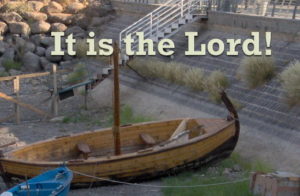 First Reading Acts 4:1-12
First Reading Acts 4:1-12While Peter and John were talking to the people the priests came up to them, accompanied by the captain of the Temple and the Sadducees. They were extremely annoyed at their teaching the people the doctrine of the resurrection from the dead by proclaiming the resurrection of Jesus. They arrested them, but as it was already late, they held them till the next day. But many of those who had listened to their message became believers, the total number of whom had now risen to something like five thousand.
Jesus showed himself again to the disciples. It was by the Sea of Tiberias, and it happened like this: Simon Peter, Thomas called the Twin, Nathanael from Cana in Galilee, the sons of Zebedee and two more of his disciples were together. Simon Peter said, ‘I’m going fishing.’ They replied, ‘We’ll come with you.’ They went out and got into the boat but caught nothing that night. It was light by now and there stood Jesus on the shore, though the disciples did not realise that it was Jesus. Jesus called out, ‘Have you caught anything, friends?’ And when they answered, ‘No’, he said, ‘Throw the net out to starboard and you’ll find something.’ So they dropped the net, and there were so many fish that they could not haul it in. The disciple Jesus loved said to Peter, ‘It is the Lord.’ At these words ‘It is the Lord’, Simon Peter, who had practically nothing on, wrapped his cloak round him and jumped into the water. The other disciples came on in the boat, towing the net and the fish; they were only about a hundred yards from land. As soon as they came ashore they saw that there was some bread there, and a charcoal fire with fish cooking on it. Jesus said, ‘Bring some of the fish you have just caught.’ Simon Peter went aboard and dragged the net to the shore, full of big fish, one hundred and fifty-three of them; and in spite of there being so many the net was not broken. Jesus said to them, ‘Come and have breakfast.’ None of the disciples was bold enough to ask, ‘Who are you?’; they knew quite well it was the Lord. Jesus then stepped forward, took the bread and gave it to them, and the same with the fish. This was the third time that Jesus showed himself to the disciples after rising from the dead.
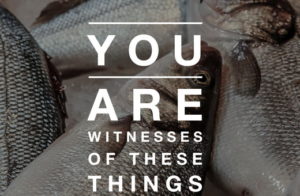 First Reading Acts 3:11-26
First Reading Acts 3:11-26Everyone came running towards Peter and John in great excitement, to the Portico of Solomon, as it is called, where the man was still clinging to Peter and John. When Peter saw the people he addressed them, ‘Why are you so surprised at this? Why are you staring at us as though we had made this man walk by our own power or holiness? You are Israelites, and it is the God of Abraham, Isaac and Jacob, the God of our ancestors, who has glorified his servant Jesus, the same Jesus you handed over and then disowned in the presence of Pilate after Pilate had decided to release him. It was you who accused the Holy One, the Just One, you who demanded the reprieve of a murderer while you killed the prince of life. God, however, raised him from the dead, and to that fact we are the witnesses; and it is the name of Jesus which, through our faith in it, has brought back the strength of this man whom you see here and who is well known to you. It is faith in that name that has restored this man to health, as you can all see. ‘Now I know, brothers, that neither you nor your leaders had any idea what you were really doing; this was the way God carried out what he had foretold, when he said through all his prophets that his Christ would suffer. Now you must repent and turn to God, so that your sins may be wiped out, and so that the Lord may send the time of comfort. Then he will send you the Christ he has predestined, that is Jesus, whom heaven must keep till the universal restoration comes which God proclaimed, speaking through his holy prophets. Moses, for example, said: The Lord God will raise up a prophet like myself for you, from among your own brothers; you must listen to whatever he tells you. The man who does not listen to that prophet is to be cut off from the people. In fact, all the prophets that have ever spoken, from Samuel onwards, have predicted these days.
The disciples told their story of what had happened on the road and how they had recognised Jesus at the breaking of bread. They were still talking about all this when Jesus himself stood among them and said to them, ‘Peace be with you!’ In a state of alarm and fright, they thought they were seeing a ghost. But he said, ‘Why are you so agitated, and why are these doubts rising in your hearts? Look at my hands and feet; yes, it is I indeed. Touch me and see for yourselves; a ghost has no flesh and bones as you can see I have.’ And as he said this he showed them his hands and feet. Their joy was so great that they still could not believe it, and they stood there dumbfounded; so he said to them, ‘Have you anything here to eat?’ And they offered him a piece of grilled fish, which he took and ate before their eyes. Then he told them, ‘This is what I meant when I said, while I was still with you, that everything written about me in the Law of Moses, in the Prophets and in the Psalms has to be fulfilled.’ He then opened their minds to understand the scriptures, and he said to them, ‘So you see how it is written that the Christ would suffer and on the third day rise from the dead, and that, in his name, repentance for the forgiveness of sins would be preached to all the nations, beginning from Jerusalem. You are witnesses to this.’
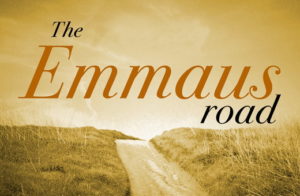 First Reading Acts 3:1-10
First Reading Acts 3:1-10Two of the disciples of Jesus were on their way to a village called Emmaus, seven miles from Jerusalem, and they were talking together about all that had happened. Now as they talked this over, Jesus himself came up and walked by their side; but something prevented them from recognising him. He said to them, ‘What matters are you discussing as you walk along?’ They stopped short, their faces downcast. Then one of them, called Cleopas, answered him, ‘You must be the only person staying in Jerusalem who does not know the things that have been happening there these last few days.’ ‘What things?’ he asked. ‘All about Jesus of Nazareth’ they answered ‘who proved he was a great prophet by the things he said and did in the sight of God and of the whole people; and how our chief priests and our leaders handed him over to be sentenced to death, and had him crucified. Our own hope had been that he would be the one to set Israel free. And this is not all: two whole days have gone by since it all happened; and some women from our group have astounded us: they went to the tomb in the early morning, and when they did not find the body, they came back to tell us they had seen a vision of angels who declared he was alive. Some of our friends went to the tomb and found everything exactly as the women had reported, but of him they saw nothing.’ Then he said to them, ‘You foolish men! So slow to believe the full message of the prophets! Was it not ordained that the Christ should suffer and so enter into his glory?’ Then, starting with Moses and going through all the prophets, he explained to them the passages throughout the scriptures that were about himself. When they drew near to the village to which they were going, he made as if to go on; but they pressed him to stay with them. ‘It is nearly evening’ they said ‘and the day is almost over.’ So he went in to stay with them. Now while he was with them at table, he took the bread and said the blessing; then he broke it and handed it to them. And their eyes were opened and they recognised him; but he had vanished from their sight. Then they said to each other, ‘Did not our hearts burn within us as he talked to us on the road and explained the scriptures to us?’ They set out that instant and returned to Jerusalem. There they found the Eleven assembled together with their companions, who said to them, ‘Yes, it is true. The Lord has risen and has appeared to Simon.’ Then they told their story of what had happened on the road and how they had recognised him at the breaking of bread.
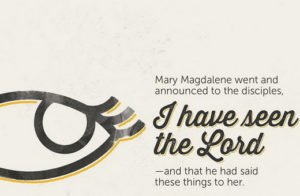 First Reading Acts 2:36-41
First Reading Acts 2:36-41On the day of Pentecost, Peter spoke to the Jews: ‘The whole House of Israel can be certain that God has made this Jesus whom you crucified both Lord and Christ.’
Mary stayed outside near the tomb, weeping. Then, still weeping, she stooped to look inside, and saw two angels in white sitting where the body of Jesus had been, one at the head, the other at the feet. They said, ‘Woman, why are you weeping?’ ‘They have taken my Lord away’ she replied ‘and I don’t know where they have put him.’ As she said this she turned round and saw Jesus standing there, though she did not recognise him. Jesus said, ‘Woman, why are you weeping? Who are you looking for?’ Supposing him to be the gardener, she said, ‘Sir, if you have taken him away, tell me where you have put him, and I will go and remove him.’ Jesus said, ‘Mary!’ She knew him then and said to him in Hebrew, ‘Rabbuni!’ – which means Master. Jesus said to her, ‘Do not cling to me, because I have not yet ascended to the Father. But go and find the brothers, and tell them: I am ascending to my Father and your Father, to my God and your God.’ So Mary of Magdala went and told the disciples that she had seen the Lord and that he had said these things to her.
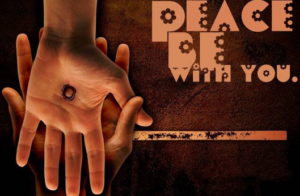 First Reading Acts 2:14,22-33
First Reading Acts 2:14,22-33On the day of Pentecost Peter stood up with the Eleven and addressed the crowd in a loud voice: ‘Men of Israel, listen to what I am going to say: Jesus the Nazarene was a man commended to you by God by the miracles and portents and signs that God worked through him when he was among you, as you all know. This man, who was put into your power by the deliberate intention and foreknowledge of God, you took and had crucified by men outside the Law. You killed him, but God raised him to life, freeing him from the pangs of Hades; for it was impossible for him to be held in its power since, as David says of him: I saw the Lord before me always, for with him at my right hand nothing can shake me. So my heart was glad and my tongue cried out with joy; my body, too, will rest in the hope that you will not abandon my soul to Hades nor allow your holy one to experience corruption. You have made known the way of life to me, you will fill me with gladness through your presence.
Filled with awe and great joy the women came quickly away from the tomb and ran to tell the disciples. And there, coming to meet them, was Jesus. ‘Greetings’ he said. And the women came up to him and, falling down before him, clasped his feet. Then Jesus said to them, ‘Do not be afraid; go and tell my brothers that they must leave for Galilee; they will see me there.’ While they were on their way, some of the guard went off into the city to tell the chief priests all that had happened. These held a meeting with the elders and, after some discussion, handed a considerable sum of money to the soldiers with these instructions, ‘This is what you must say, “His disciples came during the night and stole him away while we were asleep.” And should the governor come to hear of this, we undertake to put things right with him ourselves and to see that you do not get into trouble.’ The soldiers took the money and carried out their instructions, and to this day that is the story among the Jews.
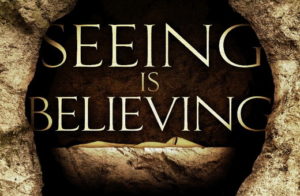 First Reading Acts 10:34,37-43
First Reading Acts 10:34,37-43It was very early on the first day of the week and still dark, when Mary of Magdala came to the tomb. She saw that the stone had been moved away from the tomb and came running to Simon Peter and the other disciple, the one Jesus loved. ‘They have taken the Lord out of the tomb’ she said ‘and we don’t know where they have put him.’ So Peter set out with the other disciple to go to the tomb. They ran together, but the other disciple, running faster than Peter, reached the tomb first; he bent down and saw the linen cloths lying on the ground, but did not go in. Simon Peter who was following now came up, went right into the tomb, saw the linen cloths on the ground, and also the cloth that had been over his head; this was not with the linen cloths but rolled up in a place by itself. Then the other disciple who had reached the tomb first also went in; he saw and he believed. Till this moment they had failed to understand the teaching of scripture, that he must rise from the dead.
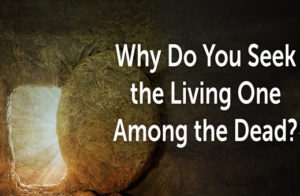 First Reading Genesis 1:26-31
First Reading Genesis 1:26-31In the beginning God created the heavens and the earth. God said, ‘Let us make man in our own image, in the likeness of ourselves, and let them be masters of the fish of the sea, the birds of heaven, the cattle, all the wild beasts and all the reptiles that crawl upon the earth.’ God created man in the image of himself, in the image of God he created him, male and female he created them.
God put Abraham to the test. ‘Abraham, Abraham’ he called. ‘Here I am’ he replied. ‘Take your son,’ God said ‘your only child Isaac, whom you love, and go to the land of Moriah. There you shall offer him as a burnt offering, on a mountain I will point out to you.’ When they arrived at the place God had pointed out to him, Abraham built an altar there, and arranged the wood. Then he bound his son Isaac and put him on the altar on top of the wood. Abraham stretched out his hand and seized the knife to kill his son. But the angel of the Lord called to him from heaven. ‘Abraham, Abraham’ he said. ‘I am here’ he replied. ‘Do not raise your hand against the boy’ the angel said. ‘Do not harm him, for now I know you fear God. You have not refused me your son, your only son.’ Then looking up, Abraham saw a ram caught by its horns in a bush. Abraham took the ram and offered it as a burnt-offering in place of his son.
The Lord said to Moses, ‘Why do you cry to me so? Tell the sons of Israel to march on. For yourself, raise your staff and stretch out your hand over the sea and part it for the sons of Israel to walk through the sea on dry ground. I for my part will make the heart of the Egyptians so stubborn that they will follow them. So shall I win myself glory at the expense of Pharaoh, of all his army, his chariots, his horsemen. And when I have won glory for myself, at the expense of Pharaoh and his chariots and his army, the Egyptians will learn that I am the Lord.’ Then the angel of God, who marched at the front of the army of Israel, changed station and moved to their rear. The pillar of cloud changed station from the front to the rear of them, and remained there. It came between the camp of the Egyptians and the camp of Israel. The cloud was dark, and the night passed without the armies drawing any closer the whole night long. Moses stretched out his hand over the sea. The Lord drove back the sea with a strong easterly wind all night, and he made dry land of the sea. The waters parted and the sons of Israel went on dry ground right into the sea, walls of water to right and to left of them. The Egyptians gave chase: after them they went, right into the sea, all Pharaoh’s horses, his chariots, and his horsemen. In the morning watch, the Lord looked down on the army of the Egyptians from the pillar of fire and of cloud, and threw the army into confusion. He so clogged their chariot wheels that they could scarcely make headway. ‘Let us flee from the Israelites,’ the Egyptians cried. ‘The Lord is fighting for them against the Egyptians!’ ‘Stretch out your hand over the sea,’ the Lord said to Moses, ‘that the waters may flow back on the Egyptians and their chariots and their horsemen.’ Moses stretched out his hand over the sea and, as day broke, the sea returned to its bed. The fleeing Egyptians marched right into it, and the Lord overthrew the Egyptians in the very middle of the sea. The returning waters overwhelmed the chariots and the horsemen of Pharaoh’s whole army, which had followed the Israelites into the sea; not a single one of them was left. But the sons of Israel had marched through the sea on dry ground, walls of water to right and to left of them. That day, the Lord rescued Israel from the Egyptians, and Israel saw the Egyptians lying dead on the shore. Israel witnessed the great act that the Lord had performed against the Egyptians, and the people venerated the Lord; they put their faith in the Lord and in Moses, his servant.
Thus says the Lord: Now your creator will be your husband, his name, the Lord of Hosts; your redeemer will be the Holy One of Israel, he is called the God of the whole earth. Yes, like a forsaken wife, distressed in spirit, the Lord calls you back. Does a man cast off the wife of his youth? says your God. I did forsake you for a brief moment, but with great love will I take you back. In excess of anger, for a moment I hid my face from you. But with everlasting love I have taken pity on you, says the Lord, your redeemer. I am now as I was in the days of Noah when I swore that Noah’s waters should never flood the world again. So now I swear concerning my anger with you and the threats I made against you; for the mountains may depart, the hills be shaken, but my love for you will never leave you and my covenant of peace with you will never be shaken, says the Lord who takes pity on you. Unhappy creature, storm-tossed, disconsolate, see, I will set your stones on carbuncles and your foundations on sapphires. I will make rubies your battlements, your gates crystal, and your entire wall precious stones. Your sons will all be taught by the Lord. The prosperity of your sons will be great. You will be founded on integrity; remote from oppression, you will have nothing to fear;
Thus says the Lord: Oh, come to the water all you who are thirsty; though you have no money, come! Buy corn without money, and eat, and, at no cost, wine and milk. Why spend money on what is not bread, your wages on what fails to satisfy? Listen, listen to me, and you will have good things to eat and rich food to enjoy. Pay attention, come to me; listen, and your soul will live. With you I will make an everlasting covenant out of the favours promised to David. See, I have made of you a witness to the peoples, a leader and a master of the nations. See, you will summon a nation you never knew, those unknown will come hurrying to you, for the sake of the Lord your God, of the Holy One of Israel who will glorify you. Seek the Lord while he is still to be found, call to him while he is still near. Let the wicked man abandon his way, the evil man his thoughts. Let him turn back to the Lord who will take pity on him, to our God who is rich in forgiving; for my thoughts are not your thoughts, my ways not your ways – it is the Lord who speaks. Yes, the heavens are as high above earth as my ways are above your ways, my thoughts above your thoughts.
Listen, Israel, to commands that bring life; hear, and learn what knowledge means. Why, Israel, why are you in the country of your enemies, growing older and older in an alien land, sharing defilement with the dead, reckoned with those who go to Sheol? Because you have forsaken the fountain of wisdom. Had you walked in the way of God, you would have lived in peace for ever. Learn where knowledge is, where strength, where understanding, and so learn where length of days is, where life, where the light of the eyes and where peace. But who has found out where she lives, who has entered her treasure house? But the One who knows all knows her, he has grasped her with his own intellect, he has set the earth firm for ever and filled it with four-footed beasts. He sends the light – and it goes, he recalls it – and trembling it obeys; the stars shine joyfully at their set times: when he calls them, they answer, ‘Here we are’; they gladly shine for their creator. It is he who is our God, no other can compare with him. He has grasped the whole way of knowledge, and confided it to his servant Jacob, to Israel his well-beloved; so causing her to appear on earth and move among men. This is the book of the commandments of God, the Law that stands for ever; those who keep her live, those who desert her die. Turn back, Jacob, seize her, in her radiance make your way to light: do not yield your glory to another, your privilege to a people not your own. Israel, blessed are we:
The word of the Lord was addressed to me as follows: ‘Son of man, the members of the House of Israel used to live in their own land, but they defiled it by their conduct and actions. I then discharged my fury at them because of the blood they shed in their land and the idols with which they defiled it. I scattered them among the nations and dispersed them in foreign countries. I sentenced them as their conduct and actions deserved. And now they have profaned my holy name among the nations where they have gone, so that people say of them, “These are the people of the Lord; they have been exiled from his land.” ‘But I have been concerned about my holy name, which the House of Israel has profaned among the nations where they have gone. ‘And so, say to the House of Israel, “The Lord says this: I am not doing this for your sake, House of Israel, but for the sake of my holy name, which you have profaned among the nations where you have gone. I mean to display the holiness of my great name, which has been profaned among the nations, which you have profaned among them. And the nations will learn that I am the Lord – it is the Lord who speaks – when I display my holiness for your sake before their eyes. Then I am going to take you from among the nations and gather you together from all the foreign countries, and bring you home to your own land.
When we were baptised in Christ Jesus we were baptised in his death; in other words, when we were baptised we went into the tomb with him and joined him in death, so that as Christ was raised from the dead by the Father’s glory, we too might live a new life. If in union with Christ we have imitated his death, we shall also imitate him in his resurrection. We must realise that our former selves have been crucified with him to destroy this sinful body and to free us from the slavery of sin. When a Christian dies, of course, he has finished with sin.
On the first day of the week, at the first sign of dawn, they went to the tomb with the spices they had prepared. They found that the stone had been rolled away from the tomb, but on entering discovered that the body of the Lord Jesus was not there. As they stood there not knowing what to think, two men in brilliant clothes suddenly appeared at their side. Terrified, the women lowered their eyes. But the two men said to them, ‘Why look among the dead for someone who is alive? He is not here; he has risen. Remember what he told you when he was still in Galilee: that the Son of Man had to be handed over into the power of sinful men and be crucified, and rise again on the third day?’ And they remembered his words. When the women returned from the tomb they told all this to the Eleven and to all the others. The women were Mary of Magdala, Joanna, and Mary the mother of James. The other women with them also told the apostles, but this story of theirs seemed pure nonsense, and they did not believe them. Peter, however, went running to the tomb. He bent down and saw the binding cloths but nothing else; he then went back home, amazed at what had happened.
 First Reading Isaiah 52:13-53:12
First Reading Isaiah 52:13-53:12See, my servant will prosper, he shall be lifted up, exalted, rise to great heights. As the crowds were appalled on seeing him – so disfigured did he look that he seemed no longer human – so will the crowds be astonished at him, and kings stand speechless before him; for they shall see something never told and witness something never heard before: ‘Who could believe what we have heard, and to whom has the power of the Lord been revealed?’ Like a sapling he grew up in front of us, like a root in arid ground. Without beauty, without majesty we saw him, no looks to attract our eyes; a thing despised and rejected by men, a man of sorrows and familiar with suffering, a man to make people screen their faces; he was despised and we took no account of him. And yet ours were the sufferings he bore, ours the sorrows he carried. But we, we thought of him as someone punished, struck by God, and brought low. Yet he was pierced through for our faults, crushed for our sins. On him lies a punishment that brings us peace, and through his wounds we are healed. We had all gone astray like sheep, each taking his own way, and the Lord burdened him with the sins of all of us. Harshly dealt with, he bore it humbly, he never opened his mouth, like a lamb that is led to the slaughter-house, like a sheep that is dumb before its shearers never opening its mouth. By force and by law he was taken; would anyone plead his cause? Yes, he was torn away from the land of the living; for our faults struck down in death. They gave him a grave with the wicked, a tomb with the rich, though he had done no wrong and there had been no perjury in his mouth. The Lord has been pleased to crush him with suffering. If he offers his life in atonement, he shall see his heirs, he shall have a long life and through him what the Lord wishes will be done. His soul’s anguish over he shall see the light and be content. By his sufferings shall my servant justify many, taking their faults on himself. Hence I will grant whole hordes for his tribute, he shall divide the spoil with the mighty, for surrendering himself to death and letting himself be taken for a sinner, while he was bearing the faults of many
Since in Jesus, the Son of God, we have the supreme high priest who has gone through to the highest heaven, we must never let go of the faith that we have professed. For it is not as if we had a high priest who was incapable of feeling our weaknesses with us; but we have one who has been tempted in every way that we are, though he is without sin. Let us be confident, then, in approaching the throne of grace, that we shall have mercy from him and find grace when we are in need of help.
Key: N. Narrator. ✠ Jesus. O. Other single speaker. C. Crowd, or more than one speaker.
- Jesus left with his disciples and crossed the Kedron valley. There was a garden there, and he went into it with his disciples. Judas the traitor knew the place well, since Jesus had often met his disciples there, and he brought the cohort to this place together with a detachment of guards sent by the chief priests and the Pharisees, all with lanterns and torches and weapons. Knowing everything that was going to happen to him, Jesus then came forward and said,
✠ Who are you looking for?
- They answered,
- Jesus the Nazarene.
- He said,
✠ I am he.
- Now Judas the traitor was standing among them. When Jesus said, ‘I am he’, they moved back and fell to the ground. He asked them a second time,
✠ Who are you looking for?
- They said,
- Jesus the Nazarene.
- Jesus replied,
✠ I have told you that I am he. If I am the one you are looking for, let these others go.
- This was to fulfil the words he had spoken, ‘Not one of those you gave me have I lost.’
Simon Peter, who carried a sword, drew it and wounded the high priest’s servant, cutting off his right ear. The servant’s name was Malchus. Jesus said to Peter, ✠ Put your sword back in its scabbard; am I not to drink the cup that the Father has given me?
- The cohort and its captain and the Jewish guards seized Jesus and bound him. They took him first to Annas, because Annas was the father-in-law of Caiaphas, who was high priest that year. It was Caiaphas who had suggested to the Jews, ‘It is better for one man to die for the people.’
Simon Peter, with another disciple, followed Jesus. This disciple, who was known to the high priest, went with Jesus into the high priest’s palace, but Peter stayed outside the door. So the other disciple, the one known to the high priest, went out, spoke to the woman who was keeping the door and brought Peter in. The maid on duty at the door said to Peter,
- Aren’t you another of that man’s disciples?
- He answered,
- I am not.
- Now it was cold, and the servants and guards had lit a charcoal fire and were standing there warming themselves; so Peter stood there too, warming himself with the others.
The high priest questioned Jesus about his disciples and his teaching. Jesus answered, ✠ I have spoken openly for all the world to hear; I have always taught in the synagogue and in the Temple where all the Jews meet together: I have said nothing in secret. But why ask me? Ask my hearers what I taught: they know what I said.
- At these words, one of the guards standing by gave Jesus a slap in the face, saying,
- Is that the way to answer the high priest?
- Jesus replied,
✠ If there is something wrong in what I said, point it out; but if there is no offence in it, why do you strike me?
- Then Annas sent him, still bound, to Caiaphas the high priest.
As Simon Peter stood there warming himself, someone said to him,
- Aren’t you another of his disciples?
- He denied it, saying,
- I am not.
- One of the high priest’s servants, a relation of the man whose ear Peter had cut off, said,
- Didn’t I see you in the garden with him?
- Again Peter denied it; and at once a cock crew.
They then led Jesus from the house of Caiaphas to the Praetorium. It was now morning. They did not go into the Praetorium themselves or they would be defiled and unable to eat the passover. So Pilate came outside to them and said,
- What charge do you bring against this man?
- They replied,
- If he were not a criminal, we should not be handing him over to you.
- Pilate said,
- Take him yourselves, and try him by your own Law.
- The Jews answered,
- We are not allowed to put a man to death.
- This was to fulfil the words Jesus had spoken indicating the way he was going to die.
So Pilate went back into the Praetorium and called Jesus to him, and asked,
- Are you the king of the Jews?
- Jesus replied,
✠ Do you ask this of your own accord, or have others spoken to you about me?
- Pilate answered,
- Am I a Jew? It is your own people and the chief priests who have handed you over to me: what have you done?
- Jesus replied,
✠ Mine is not a kingdom of this world; if my kingdom were of this world, my men would have fought to prevent my being surrendered to the Jews. But my kingdom is not of this kind.
- Pilate said,
- So you are a king, then?
- Jesus answered,
✠ It is you who say it. Yes, I am a king. I was born for this, I came into the world for this: to bear witness to the truth; and all who are on the side of truth listen to my voice.
- Pilate said,
- Truth? What is that?
- and with that he went out again to the Jews and said,
- I find no case against him. But according to a custom of yours I should release one prisoner at the Passover; would you like me, then, to release the king of the Jews?
- At this they shouted:
- Not this man, but Barabbas.
- Barabbas was a brigand.
Pilate then had Jesus taken away and scourged; and after this, the soldiers twisted some thorns into a crown and put it on his head, and dressed him in a purple robe. They kept coming up to him and saying,
- Hail, king of the Jews!
- and they slapped him in the face.
Pilate came outside again and said to them,
- Look, I am going to bring him out to you to let you see that I find no case.
- Jesus then came out wearing the crown of thorns and the purple robe. Pilate said,
- Here is the man.
- When they saw him the chief priests and the guards shouted,
- Crucify him! Crucify him!
- Pilate said,
- Take him yourselves and crucify him: I can find no case against him.
- The Jews replied,
- We have a Law, and according to that Law he ought to die, because he has claimed to be the Son of God.
- When Pilate heard them say this his fears increased. Re-entering the Praetorium, he said to Jesus
- Where do you come from?
- But Jesus made no answer. Pilate then said to him,
- Are you refusing to speak to me? Surely you know I have power to release you and I have power to crucify you?
- Jesus replied,
✠ You would have no power over me if it had not been given you from above; that is why the one who handed me over to you has the greater guilt.
- From that moment Pilate was anxious to set him free, but the Jews shouted,
- If you set him free you are no friend of Caesar’s; anyone who makes himself king is defying Caesar.
- Hearing these words, Pilate had Jesus brought out, and seated himself on the chair of judgement at a place called the Pavement, in Hebrew Gabbatha. It was Passover Preparation Day, about the sixth hour. Pilate said to the Jews,
- Here is your king.
- They said,
- Take him away, take him away! Crucify him!
- Pilate said,
- Do you want me to crucify your king?
- The chief priests answered,
- We have no king except Caesar.
- So in the end Pilate handed him over to them to be crucified.
They then took charge of Jesus, and carrying his own cross he went out of the city to the place of the skull or, as it was called in Hebrew, Golgotha, where they crucified him with two others, one on either side with Jesus in the middle. Pilate wrote out a notice and had it fixed to the cross; it ran: ‘Jesus the Nazarene, King of the Jews.’ This notice was read by many of the Jews, because the place where Jesus was crucified was not far from the city, and the writing was in Hebrew, Latin and Greek. So the Jewish chief priests said to Pilate,
- You should not write ‘King of the Jews,’ but ‘This man said: “I am King of the Jews.”’
- Pilate answered,
- What I have written, I have written.
- When the soldiers had finished crucifying Jesus they took his clothing and divided it into four shares, one for each soldier. His undergarment was seamless, woven in one piece from neck to hem; so they said to one another,
- Instead of tearing it, let’s throw dice to decide who is to have it.
- In this way the words of scripture were fulfilled:
They shared out my clothing among them. They cast lots for my clothes. This is exactly what the soldiers did. Near the cross of Jesus stood his mother and his mother’s sister, Mary the wife of Clopas, and Mary of Magdala. Seeing his mother and the disciple he loved standing near her, Jesus said to his mother, ✠ Woman, this is your son.
- Then to the disciple he said,
✠ This is your mother.
- And from that moment the disciple made a place for her in his home.
After this, Jesus knew that everything had now been completed, and to fulfil the scripture perfectly he said: ✠ I am thirsty.
- A jar full of vinegar stood there, so putting a sponge soaked in the vinegar on a hyssop stick they held it up to his mouth. After Jesus had taken the vinegar he said,
✠ It is accomplished;
- and bowing his head he gave up his spirit.
Here all kneel and pause for a short time. It was Preparation Day, and to prevent the bodies remaining on the cross during the sabbath – since that sabbath was a day of special solemnity – the Jews asked Pilate to have the legs broken and the bodies taken away. Consequently the soldiers came and broke the legs of the first man who had been crucified with him and then of the other. When they came to Jesus, they found he was already dead, and so instead of breaking his legs one of the soldiers pierced his side with a lance; and immediately there came out blood and water. This is the evidence of one who saw it – trustworthy evidence, and he knows he speaks the truth – and he gives it so that you may believe as well. Because all this happened to fulfil the words of scripture: Not one bone of his will be broken; and again, in another place scripture says: They will look on the one whom they have pierced. After this, Joseph of Arimathaea, who was a disciple of Jesus – though a secret one because he was afraid of the Jews – asked Pilate to let him remove the body of Jesus. Pilate gave permission, so they came and took it away. Nicodemus came as well – the same one who had first come to Jesus at night-time – and he brought a mixture of myrrh and aloes, weighing about a hundred pounds. They took the body of Jesus and wrapped it with the spices in linen cloths, following the Jewish burial custom. At the place where he had been crucified there was a garden, and in this garden a new tomb in which no one had yet been buried. Since it was the Jewish Day of Preparation and the tomb was near at hand, they laid Jesus there.
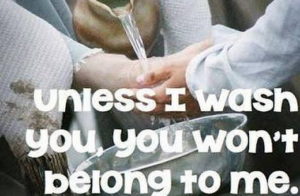 First Reading Exodus 12:1-8,11-14
First Reading Exodus 12:1-8,11-14The Lord said to Moses and Aaron in the land of Egypt:
It was before the festival of the Passover, and Jesus knew that the hour had come for him to pass from this world to the Father. He had always loved those who were his in the world, but now he showed how perfect his love was. They were at supper, and the devil had already put it into the mind of Judas Iscariot son of Simon, to betray him. Jesus knew that the Father had put everything into his hands, and that he had come from God and was returning to God, and he got up from table, removed his outer garment and, taking a towel, wrapped it round his waist; he then poured water into a basin and began to wash the disciples’ feet and to wipe them with the towel he was wearing. He came to Simon Peter, who said to him, ‘Lord, are you going to wash my feet?’ Jesus answered, ‘At the moment you do not know what I am doing, but later you will understand.’ ‘Never!’ said Peter ‘You shall never wash my feet.’ Jesus replied, ‘If I do not wash you, you can have nothing in common with me.’ ‘Then, Lord,’ said Simon Peter ‘not only my feet, but my hands and my head as well!’ Jesus said, ‘No one who has taken a bath needs washing, he is clean all over. You too are clean, though not all of you are.’ He knew who was going to betray him, that was why he said, ‘though not all of you are.’ When he had washed their feet and put on his clothes again he went back to the table. ‘Do you understand’ he said ‘what I have done to you? You call me Master and Lord, and rightly; so I am. If I, then, the Lord and Master, have washed your feet, you should wash each other’s feet. I have given you an example so that you may copy what I have done to you.’
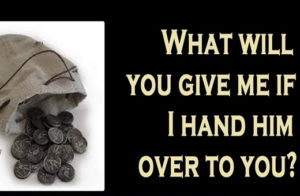 First Reading Isaiah 50:4-9
First Reading Isaiah 50:4-9The Lord has given me a disciple’s tongue. So that I may know how to reply to the wearied he provides me with speech. Each morning he wakes me to hear, to listen like a disciple. The Lord has opened my ear. For my part, I made no resistance, neither did I turn away. I offered my back to those who struck me, my cheeks to those who tore at my beard; I did not cover my face against insult and spittle. The Lord comes to my help, so that I am untouched by the insults. So, too, I set my face like flint; I know I shall not be shamed. My vindicator is here at hand. Does anyone start proceedings against me? Then let us go to court together. Who thinks he has a case against me? Let him approach me. The Lord is coming to my help,
One of the Twelve, the man called Judas Iscariot, went to the chief priests and said, ‘What are you prepared to give me if I hand him over to you?’ They paid him thirty silver pieces, and from that moment he looked for an opportunity to betray him. Now on the first day of Unleavened Bread the disciples came to Jesus to say, ‘Where do you want us to make the preparations for you to eat the passover?’ ‘Go to so-and-so in the city’ he replied ‘and say to him, “The Master says: My time is near. It is at your house that I am keeping Passover with my disciples.”’ The disciples did what Jesus told them and prepared the Passover. When evening came he was at table with the twelve disciples. And while they were eating he said ‘I tell you solemnly, one of you is about to betray me.’ They were greatly distressed and started asking him in turn, ‘Not I, Lord, surely?’ He answered, ‘Someone who has dipped his hand into the dish with me, will betray me. The Son of Man is going to his fate, as the scriptures say he will, but alas for that man by whom the Son of Man is betrayed! Better for that man if he had never been born!’ Judas, who was to betray him; asked in his turn, ‘Not I, Rabbi, surely?’ ‘They are your own words’ answered Jesus.
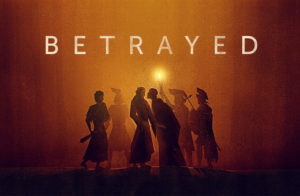 First Reading Isaiah 49:1-6
First Reading Isaiah 49:1-6Islands, listen to me, pay attention, remotest peoples. The Lord called me before I was born, from my mother’s womb he pronounced my name. He made my mouth a sharp sword, and hid me in the shadow of his hand. He made me into a sharpened arrow, and concealed me in his quiver. He said to me, ‘You are my servant (Israel) in whom I shall be glorified’; while I was thinking, ‘I have toiled in vain, I have exhausted myself for nothing’; and all the while my cause was with the Lord, my reward with my God. I was honoured in the eyes of the Lord, my God was my strength. And now the Lord has spoken, he who formed me in the womb to be his servant, to bring Jacob back to him, to gather Israel to him: ‘It is not enough for you to be my servant, to restore the tribes of Jacob and bring back the survivors of Israel; I will make you the light of the nations
While at supper with his disciples, Jesus was troubled in spirit and declared, ‘I tell you most solemnly, one of you will betray me.’ The disciples looked at one another, wondering which he meant. The disciple Jesus loved was reclining next to Jesus; Simon Peter signed to him and said, ‘Ask who it is he means’, so leaning back on Jesus’ breast he said, ‘Who is it, Lord?’ ‘It is the one’ replied Jesus ‘to whom I give the piece of bread that I shall dip in the dish.’ He dipped the piece of bread and gave it to Judas son of Simon Iscariot. At that instant, after Judas had taken the bread, Satan entered him. Jesus then said, ‘What you are going to do, do quickly.’ None of the others at table understood the reason he said this. Since Judas had charge of the common fund, some of them thought Jesus was telling him, ‘Buy what we need for the festival’, or telling him to give something to the poor. As soon as Judas had taken the piece of bread he went out. Night had fallen. When he had gone Jesus said: ‘Now has the Son of Man been glorified, and in him God has been glorified. If God has been glorified in him, God will in turn glorify him in himself, and will glorify him very soon. ‘My little children, I shall not be with you much longer. You will look for me, And, as I told the Jews, where I am going, you cannot come.’ Simon Peter said, ‘Lord, where are you going?’ Jesus replied, ‘Where I am going you cannot follow me now; you will follow me later.’ Peter said to him, ‘Why can’t I follow you now? I will lay down my life for you.’ ‘Lay down your life for me?’ answered Jesus. ‘I tell you most solemnly, before the cock crows you will have disowned me three times.’
 First Reading Isaiah 42:1-7
First Reading Isaiah 42:1-7Here is my servant whom I uphold, my chosen one in whom my soul delights. I have endowed him with my spirit that he may bring true justice to the nations. He does not cry out or shout aloud, or make his voice heard in the streets. He does not break the crushed reed, nor quench the wavering flame. Faithfully he brings true justice; he will neither waver, nor be crushed until true justice is established on earth, for the islands are awaiting his law. Thus says God, the Lord, he who created the heavens and spread them out, who gave shape to the earth and what comes from it, who gave breath to its people and life to the creatures that move in it: ‘I, the Lord, have called you to serve the cause of right; I have taken you by the hand and formed you; I have appointed you as covenant of the people and light of the nations, ‘to open the eyes of the blind, to free captives from prison,
Meanwhile a large number of Jews heard that he was there and came not only on account of Jesus but also to see Lazarus whom he had raised from the dead. Then the chief priests decided to kill Lazarus as well, since it was on his account that many of the Jews were leaving them and believing in Jesus.
 First Reading Isaiah 50:4-7
First Reading Isaiah 50:4-7So that I may know how to reply to the wearied he provides me with speech. Each morning he wakes me to hear, to listen like a disciple. The Lord has opened my ear. For my part, I made no resistance, neither did I turn away. I offered my back to those who struck me, my cheeks to those who tore at my beard; I did not cover my face against insult and spittle. The Lord comes to my help, so that I am untouched by the insults. So, too, I set my face like flint; I know I shall not be shamed. Second Reading Philippians 2:6-11 His state was divine, yet Christ Jesus did not cling to his equality with God but emptied himself to assume the condition of a slave and became as men are; and being as all men are, he was humbler yet, even to accepting death, death on a cross. But God raised him high and gave him the name which is above all other names so that all beings in the heavens, on earth and in the underworld, should bend the knee at the name of Jesus and that every tongue should acclaim Jesus Christ as Lord, to the glory of God the Father. Gospel Luke 22:14-23:56 When the hour came, Jesus took his place at table, and the apostles with him. And he said to them, ✠ I have longed to eat this passover with you before I suffer; because, I tell you, I shall not eat it again until it is fulfilled in the kingdom of God.
- Then, taking a cup, he gave thanks and said,
✠ Take this and share it among you, because from now on, I tell you, I shall not drink wine until the kingdom of God comes.
- Then he took some bread, and when he had given thanks, broke it and gave it to them, saying,
✠ This is my body which will be given for you; do this as a memorial of me.
- He did the same with the cup after supper, and said,
✠ This cup is the new covenant in my blood which will be poured out for you. And yet, here with me on the table is the hand of the man who betrays me. The Son of Man does indeed go to his fate even as it has been decreed, but alas for that man by whom he is betrayed!
- And they began to ask one another which of them it could be who was to do this thing.
A dispute arose also between them about which should be reckoned the greatest, but he said to them, ✠ Among pagans it is the kings who lord it over them, and those who have authority over them are given the title Benefactor. This must not happen with you. No; the greatest among you must behave as if he were the youngest, the leader as if he were the one who serves. For who is the greater: the one at table or the one who serves? The one at table, surely? Yet here am I among you as one who serves! You are the men who have stood by me faithfully in my trials; and now I confer a kingdom on you, just as my Father conferred one on me: you will eat and drink at my table in my kingdom, and you will sit on thrones to judge the twelve tribes of Israel. Simon, Simon! Satan, you must know, has got his wish to sift you all like wheat; but I have prayed for you, Simon, that your faith may not fail, and once you have recovered, you in your turn must strengthen your brothers.
- He answered,
- Lord, I would be ready to go to prison with you, and to death.
- Jesus replied,
✠ I tell you, Peter, by the time the cock crows today you will have denied three times that you know me.
- He said to them,
✠ When I sent you out without purse or haversack or sandals, were you short of anything?
- They answered,
- No.
- He said to them,
✠ But now if you have a purse, take it; if you have a haversack, do the same; if you have no sword, sell your cloak and buy one, because I tell you these words of scripture have to be fulfilled in me: He let himself be taken for a criminal. Yes, what scripture says about me is even now reaching its fulfilment.
- They said,
- Lord, there are two swords here now.
- He said to them,
✠ That is enough!
- He then left to make his way as usual to the Mount of Olives, with the disciples following. When they reached the place he said to them,
✠ Pray not to be put to the test.
- Then he withdrew from them, about a stone’s throw away, and knelt down and prayed, saying,
✠ Father, if you are willing, take this cup away from me. Nevertheless, let your will be done, not mine.
- Then an angel appeared to him, coming from heaven to give him strength. In his anguish he prayed even more earnestly, and his sweat fell to the ground like great drops of blood.
When he rose from prayer he went to the disciples and found them sleeping for sheer grief. He said to them, ✠ Why are you asleep? Get up and pray not to be put to the test.
- He was still speaking when a number of men appeared, and at the head of them the man called Judas, one of the Twelve, who went up to Jesus to kiss him. Jesus said,
✠ Judas, are you betraying the son of Man with a kiss?
- His followers, seeing what was happening, said,
- Lord, shall we use our swords?
- And one of them struck out at the high priest’s servant, and cut off his right ear. But at this Jesus spoke:
✠ Leave off! That will do!
- And touching the man’s ear he healed him.
Then Jesus spoke to the chief priests and captains of the Temple guard and elders who had come for him. He said, ✠ Am I a brigand, that you had to set out with swords and clubs? When I was among you in the Temple day after day you never moved to lay hands on me. But this is your hour; this is the reign of darkness.
- They seized him then and led him away, and they took him to the high priest’s house. Peter followed at a distance. They had lit a fire in the middle of the courtyard and Peter sat down among them, and as he was sitting there by the blaze a servant-girl saw him, peered at him, and said,
- This person was with him too.
- But he denied it.
- Woman, I do not know him.
- Shortly afterwards someone else saw him and said,
- You are another of them.
- But Peter replied,
- I am not, my friend.
- About an hour later another man insisted, saying,
- This fellow was certainly with him. Why, he is a Galilean.
- Peter said,
- My friend, I do not know what you are talking about.
- At that instant, while he was still speaking, the cock crew, and the Lord turned and looked straight at Peter, and Peter remembered what the Lord had said to him, ‘Before the cock crows today, you will have disowned me three times.’ And he went outside and wept bitterly.
Meanwhile the men who guarded Jesus were mocking and beating him. They blindfolded him and questioned him, saying,
- Play the prophet. Who hit you then?
- And they continued heaping insults on him.
When day broke there was a meeting of the elders of the people, attended by the chief priests and scribes. He was brought before their council, and they said to him,
- If you are the Christ, tell us.
- He replied,
✠ If I tell you, you will not believe me, and if I question you, you will not answer. But from now on, the Son of Man will be seated at the right hand of the Power of God.
- Then they all said,
- So you are the Son of God then?
- He answered:
✠ It is you who say I am.
- They said,
- What need of witnesses have we now? We have heard it for ourselves from his own lips.
- The whole assembly then rose, and they brought him before Pilate.
They began their accusation by saying,
- We found this man inciting our people to revolt, opposing payment of the tribute to Caesar, and claiming to be Christ, a king.
- Pilate put to him this question:
- Are you the king of the Jews?
- He replied,
✠ It is you who say it.
- Pilate then said to the chief priests and the crowd,
- I find no case against this man.
- But they persisted,
- He is inflaming the people with his teaching all over Judaea; it has come all the way from Galilee, where he started, down to here.
- When Pilate heard this, he asked if the man were a Galilean; and finding that he came under Herod’s jurisdiction he passed him over to Herod, who was also in Jerusalem at that time.
Herod was delighted to see Jesus; he had heard about him and had been wanting for a long time to set eyes on him; moreover, he was hoping to see some miracle worked by him. So he questioned him at some length; but without getting any reply. Meanwhile the chief priests and the scribes were there, violently pressing their accusations. Then Herod, together with his guards, treated him with contempt and made fun of him; he put a rich cloak on him and sent him back to Pilate. And though Herod and Pilate had been enemies before, they were reconciled that same day. Pilate then summoned the chief priests and the leading men and the people. He said,
- You brought this man before me as a political agitator. Now I have gone into the matter myself in your presence and found no case against the man in respect of all the charges you bring against him. Nor has Herod either, since he has sent him back to us. As you can see, the man has done nothing that deserves death, So I shall have him flogged and then let him go.
- But as one man they howled,
- Away with him! Give us Barabbas!
- (This man had been thrown into prison for causing a riot in the city and for murder.)
Pilate was anxious to set Jesus free and addressed them again, but they shouted back,
- Crucify him! Crucify him!
- And for the third time he spoke to them,
- Why? What harm has this man done? I have found no case against him that deserves death, so I shall have him punished and then let him go.
- But they kept on shouting at the top of their voices, demanding that he should be crucified. And their shouts were growing louder.
Pilate then gave his verdict: their demand was to be granted. He released the man they asked for, who had been imprisoned for rioting and murder, and handed Jesus over to them to deal with as they pleased. As they were leading him away they seized on a man, Simon from Cyrene, who was coming in from the country, and made him shoulder the cross and carry it behind Jesus. Large numbers of people followed him, and of women too, who mourned and lamented for him. But Jesus turned to them and said, ✠ Daughters of Jerusalem, do not weep for me; weep rather for yourselves and for your children. For the days will surely come when people will say, ‘Happy are those who are barren, the wombs that have never borne, the breasts that have never suckled!’ Then they will begin to say to the mountains, ‘Fall on us!’; to the hills, ‘Cover us.’ For if men use the green wood like this, what will happen when it is dry?
- Now with him they were also leading out two other criminals to be executed.
When they reached the place called The Skull, they crucified him there and the two criminals also, one on the right, the other on the left. Jesus said, ✠ Father, forgive them; they do not know what they are doing.
- Then they cast lots to share out his clothing.
The people stayed there watching him. As for the leaders, they jeered at him, saying,
- He saved others, let him save himself if he is the Christ of God, the Chosen One.
- The soldiers mocked him too, and when they approached to offer vinegar they said,
- If you are the king of the Jews, save yourself.
- Above him there was an inscription: ‘This is the King of the Jews.’
One of the criminals hanging there abused him, saying,
- Are you not the Christ? Save yourself and us as well.
- But the other spoke up and rebuked him:
- Have you no fear of God at all? You got the same sentence as he did, but in our case we deserved it: we are paying for what we did. But this man has done nothing wrong. Jesus, remember me when you come into your kingdom.
- He replied,
✠ Indeed, I promise you, today you will be with me in paradise.
- It was now about the sixth hour and, with the sun eclipsed, a darkness came over the whole land until the ninth hour. The veil of the Temple was torn right down the middle; and when Jesus had cried out in a loud voice, he said,
✠ Father, into your hands I commit my spirit.
- With these words he breathed his last.
All kneel and pause a moment When the centurion saw what had taken place, he gave praise to God and said,
- This was a great and good man.
- And when all the people who had gathered for the spectacle saw what had happened, they went home beating their breasts.
All his friends stood at a distance; so also did the women who had accompanied him from Galilee, and they saw all this happen. Then a member of the council arrived, an upright and virtuous man named Joseph. He had not consented to what the others had planned and carried out. He came from Arimathaea, a Jewish town, and he lived in the hope of seeing the kingdom of God. This man went to Pilate and asked for the body of Jesus. He then took it down, wrapped it in a shroud and put him in a tomb which was hewn in stone in which no one had yet been laid. It was Preparation Day and the sabbath was imminent. Meanwhile the women who had come from Galilee with Jesus were following behind. They took note of the tomb and of the position of the body. Then they returned and prepared spices and ointments. And on the sabbath day they rested, as the Law required.
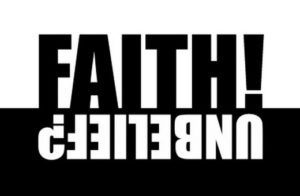 First Reading Ezekiel 37:21-28
First Reading Ezekiel 37:21-28Many of the Jews who had come to visit Mary and had seen what Jesus did believed in him, but some of them went to tell the Pharisees what Jesus had done. Then the chief priests and Pharisees called a meeting. ‘Here is this man working all these signs’ they said ‘and what action are we taking? If we let him go on in this way everybody will believe in him, and the Romans will come and destroy the Holy Place and our nation.’ One of them, Caiaphas, the high priest that year, said, ‘You do not seem to have grasped the situation at all; you fail to see that it is better for one man to die for the people, than for the whole nation to be destroyed.’ He did not speak in his own person, it was as high priest that he made this prophecy that Jesus was to die for the nation – and not for the nation only, but to gather together in unity the scattered children of God. From that day they were determined to kill him. So Jesus no longer went about openly among the Jews, but left the district for a town called Ephraim, in the country bordering on the desert, and stayed there with his disciples. The Jewish Passover drew near, and many of the country people who had gone up to Jerusalem to purify themselves looked out for Jesus, saying to one another as they stood about in the Temple, ‘What do you think? Will he come to the festival or not?’
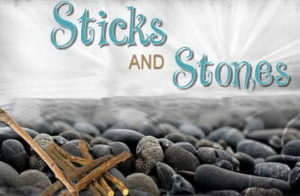 First Reading Jeremiah 20:10-13
First Reading Jeremiah 20:10-13Jeremiah said: I hear so many disparaging me, ‘“Terror from every side!” Denounce him! Let us denounce him!’ All those who used to be my friends watched for my downfall, ‘Perhaps he will be seduced into error. Then we will master him and take our revenge!’ But the Lord is at my side, a mighty hero; my opponents will stumble, mastered, confounded by their failure; everlasting, unforgettable disgrace will be theirs. But you, O Lord of Hosts, you who probe with justice, who scrutinise the loins and heart, let me see the vengeance you will take on them, for I have committed my cause to you. Sing to the Lord, praise the Lord, for he has delivered the soul of the needy
The Jews fetched stones to stone him, so Jesus said to them, ‘I have done many good works for you to see, works from my Father; for which of these are you stoning me?’ The Jews answered him, ‘We are not stoning you for doing a good work but for blasphemy: you are only a man and you claim to be God.’ Jesus answered: ‘Is it not written in your Law: I said, you are gods? So the Law uses the word gods of those to whom the word of God was addressed, and scripture cannot be rejected. Yet you say to someone the Father has consecrated and sent into the world, “You are blaspheming,” because he says, “I am the son of God.” If I am not doing my Father’s work, there is no need to believe me; but if I am doing it, then even if you refuse to believe in me, at least believe in the work I do; then you will know for sure that the Father is in me and I am in the Father.’ They wanted to arrest him then, but he eluded them. He went back again to the far side of the Jordan to stay in the district where John had once been baptising. Many people who came to him there said, ‘John gave no signs, but all he said about this man was true’; and many of them believed in him.
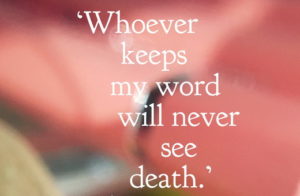 First Reading Genesis 17:3-9
First Reading Genesis 17:3-9Jesus said to the Jews: ‘I tell you most solemnly, whoever keeps my word will never see death.’ The Jews said, ‘Now we know for certain that you are possessed. Abraham is dead, and the prophets are dead, and yet you say, “Whoever keeps my word will never know the taste of death.” Are you greater than our father Abraham, who is dead? The prophets are dead too. Who are you claiming to be?’ Jesus answered: ‘If I were to seek my own glory that would be no glory at all; my glory is conferred by the Father, by the one of whom you say, “He is our God” although you do not know him. But I know him, and if I were to say: I do not know him, I should be a liar, as you are liars yourselves. But I do know him, and I faithfully keep his word. Your father Abraham rejoiced to think that he would see my Day; he saw it and was glad.’ The Jews then said, ‘You are not fifty yet, and you have seen Abraham!’ Jesus replied: ‘I tell you most solemnly, before Abraham ever was, I Am.’ At this they picked up stones to throw at him; but Jesus hid himself and left the Temple.
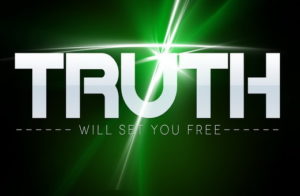 First Reading Daniel 3:14-20,24-25,28
First Reading Daniel 3:14-20,24-25,28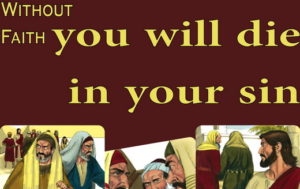 First Reading Numbers 21:4-9
First Reading Numbers 21:4-9  First Reading Daniel 13:41-62
First Reading Daniel 13:41-62Susanna was condemned to death. She cried out as loud as she could, ‘Eternal God, you know all secrets and everything before it happens; you know that they have given false evidence against me. And now have I to die, innocent as I am of everything their malice has invented against me?’ The Lord heard her cry and, as she was being led away to die, he roused the holy spirit residing in a young boy named Daniel who began to shout, ‘I am innocent of this woman’s death!’ At which all the people turned to him and asked, ‘What do you mean by these words?’ Standing in the middle of the crowd he replied, ‘Are you so stupid, sons of Israel, as to condemn a daughter of Israel unheard, and without troubling to find out the truth? Go back to the scene of the trial: these men have given false evidence against her.’ All the people hurried back, and the elders said to Daniel, ‘Come and sit with us and tell us what you mean, since God has given you the gifts that elders have.’ Daniel said, ‘Keep the men well apart from each other for I want to question them.’ When the men had been separated, Daniel had one of them brought to him. ‘You have grown old in wickedness,’ he said ‘and now the sins of your earlier days have overtaken you, you with your unjust judgements, your condemnation of the innocent, your acquittal of guilty men, when the Lord has said, “You must not put the innocent and the just to death.” Now then, since you saw her so clearly, tell me what tree you saw them lying under?’ He replied, ‘Under a mastic tree.’ Daniel said, ‘True enough! Your lie recoils on your own head: the angel of God has already received your sentence from him and will slash you in half.’ He dismissed the man, ordered the other to be brought and said to him, ‘Spawn of Canaan, not of Judah, beauty has seduced you, lust has led your heart astray! This is how you have been behaving with the daughters of Israel and they were too frightened to resist; but here is a daughter of Judah who could not stomach your wickedness! Now then, tell me what tree you surprised them under?’ He replied, ‘Under a holm oak.’ Daniel said, ‘True enough! Your lie recoils on your own head: the angel of God is waiting, with a sword to drive home and split you, and destroy the pair of you.’
Jesus said to the Pharisees: ‘I am the light of the world; anyone who follows me will not be walking in the dark; he will have the light of life.’ At this the Pharisees said to him, ‘You are testifying on your own behalf; your testimony is not valid.’ Jesus replied: ‘It is true that I am testifying on my own behalf, but my testimony is still valid, because I know where I came from and where I am going; but you do not know where I come from or where I am going. You judge by human standards; I judge no one, but if I judge, my judgement will be sound, because I am not alone: the one who sent me is with me; and in your Law it is written that the testimony of two witnesses is valid. I may be testifying on my own behalf, but the Father who sent me is my witness too.’ They asked him, ‘Where is your Father?’ Jesus answered: ‘You do not know me, nor do you know my Father; if you did know me, you would know my Father as well.’ He spoke these words in the Treasury, while teaching in the Temple. No one arrested him, because his time had not yet come.
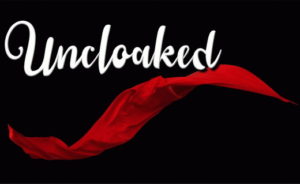 First Reading Wisdom 2:1,12-22
First Reading Wisdom 2:1,12-22The godless say to themselves, with their misguided reasoning: ‘Our life is short and dreary, nor is there any relief when man’s end comes, nor is anyone known who can give release from Hades. Let us lie in wait for the virtuous man, since he annoys us and opposes our way of life, reproaches us for our breaches of the law and accuses us of playing false to our upbringing. He claims to have knowledge of God, and calls himself a son of the Lord. Before us he stands, a reproof to our way of thinking, the very sight of him weighs our spirits down; his way of life is not like other men’s, the paths he treads are unfamiliar. In his opinion we are counterfeit; he holds aloof from our doings as though from filth; he proclaims the final end of the virtuous as happy and boasts of having God for his father. Let us see if what he says is true, let us observe what kind of end he himself will have. If the virtuous man is God’s son, God will take his part and rescue him from the clutches of his enemies. Let us test him with cruelty and with torture, and thus explore this gentleness of his and put his endurance to the proof. Let us condemn him to a shameful death since he will be looked after – we have his word for it.’ This is the way they reason, but they are misled, their malice makes them blind. They do not know the hidden things of God, they have no hope that holiness will be rewarded,
Jesus stayed in Galilee; he could not stay in Judaea, because the Jews were out to kill him. As the Jewish feast of Tabernacles drew near, after his brothers had left for the festival, he went up as well, but quite privately, without drawing attention to himself. Meanwhile some of the people of Jerusalem were saying, ‘Isn’t this the man they want to kill? And here he is, speaking freely, and they have nothing to say to him! Can it be true the authorities have made up their minds that he is the Christ? Yet we all know where he comes from, but when the Christ appears no one will know where he comes from.’ Then, as Jesus taught in the Temple, he cried out: ‘Yes, you know me and you know where I came from. Yet I have not come of myself: no, there is one who sent me and I really come from him, and you do not know him, but I know him because I have come from him and it was he who sent me.’ They would have arrested him then, but because his time had not yet come no one laid a hand on him.
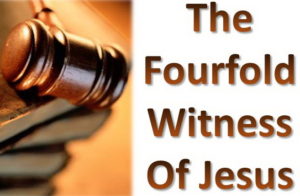 First Reading Exodus 32:7-14
First Reading Exodus 32:7-14The Lord spoke to Moses, ‘Go down now, because your people whom you brought out of Egypt have apostatised. They have been quick to leave the way I marked out for them; they have made themselves a calf of molten metal and have worshipped it and offered it sacrifice. “Here is your God, Israel,” they have cried “who brought you up from the land of Egypt!”’ the Lord said to Moses, ‘I can see how headstrong these people are! Leave me, now, my wrath shall blaze out against them and devour them; of you, however, I will make a great nation.’ But Moses pleaded with the Lord his God. ‘Lord,’ he said ‘why should your wrath blaze out against this people of yours whom you brought out of the land of Egypt with arm outstretched and mighty hand? Why let the Egyptians say, “Ah, it was in treachery that he brought them out, to do them to death in the mountains and wipe them off the face of the earth”? Leave your burning wrath; relent and do not bring this disaster on your people. Remember Abraham, Isaac and Jacob, your servants to whom by your own self you swore and made this promise: I will make your offspring as many as the stars of heaven, and all this land which I promised I will give to your descendants, and it shall be their heritage for ever.’
Jesus said to the Jews: ‘Were I to testify on my own behalf, my testimony would not be valid; but there is another witness who can speak on my behalf, and I know that his testimony is valid. You sent messengers to John, and he gave his testimony to the truth: not that I depend on human testimony; no, it is for your salvation that I speak of this. John was a lamp alight and shining and for a time you were content to enjoy the light that he gave. But my testimony is greater than John’s: the works my Father has given me to carry out, these same works of mine testify that the Father has sent me. Besides, the Father who sent me bears witness to me himself. You have never heard his voice, you have never seen his shape, and his word finds no home in you because you do not believe in the one he has sent. ‘You study the scriptures, believing that in them you have eternal life; now these same scriptures testify to me, and yet you refuse to come to me for life! As for human approval, this means nothing to me. Besides, I know you too well: you have no love of God in you. I have come in the name of my Father and you refuse to accept me; if someone else comes in his own name you will accept him. How can you believe, since you look to one another for approval and are not concerned with the approval that comes from the one God? Do not imagine that I am going to accuse you before the Father: you place your hopes on Moses, and Moses will be your accuser. If you really believed him you would believe me too, since it was I that he was writing about; but if you refuse to believe what he wrote, how can you believe what I say?’
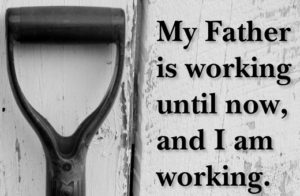 First Reading Isaiah 49:8-15
First Reading Isaiah 49:8-15Thus says the Lord: At the favourable time I will answer you, on the day of salvation I will help you. (I have formed you and have appointed you as covenant of the people.) I will restore the land and assign you the estates that lie waste. I will say to the prisoners, ‘Come out’, to those who are in darkness, ‘Show yourselves.’ On every roadway they will graze, and each bare height shall be their pasture. They will never hunger or thirst, scorching wind and sun shall never plague them; for he who pities them will lead them and guide them to springs of water. I will make a highway of all the mountains, and the high roads shall be banked up. Some are on their way from afar, others from the north and the west, others from the land of Sinim. Shout for joy, you heavens; exult, you earth! You mountains, break into happy cries! For the Lord consoles his people and takes pity on those who are afflicted. For Zion was saying, ‘The Lord has abandoned me, the Lord has forgotten me.’ Does a woman forget her baby at the breast, or fail to cherish the son of her womb? Yet even if these forget,
Jesus said to the Jews, ‘My Father goes on working, and so do I.’ But that only made them even more intent on killing him, because, not content with breaking the sabbath, he spoke of God as his own Father, and so made himself God’s equal. To this accusation Jesus replied: ‘I tell you most solemnly, the Son can do nothing by himself; he can do only what he sees the Father doing: and whatever the Father does the Son does too. For the Father loves the Son and shows him everything he does himself, and he will show him even greater things than these, works that will astonish you. Thus, as the Father raises the dead and gives them life, so the Son gives life to anyone he chooses; for the Father judges no one; he has entrusted all judgement to the Son, so that all may honour the Son as they honour the Father. Whoever refuses honour to the Son refuses honour to the Father who sent him. I tell you most solemnly, whoever listens to my words, and believes in the one who sent me, has eternal life; without being brought to judgement he has passed from death to life. I tell you most solemnly, the hour will come – in fact it is here already – when the dead will hear the voice of the Son of God, and all who hear it will live. For the Father, who is the source of life, has made the Son the source of life; and, because he is the Son of Man, has appointed him supreme judge. Do not be surprised at this, for the hour is coming when the dead will leave their graves at the sound of his voice: those who did good will rise again to life; and those who did evil, to condemnation. I can do nothing by myself; I can only judge as I am told to judge, and my judging is just, because my aim is to do not my own will, but the will of him who sent me.’
 First Reading Ezekiel 47:1-9,12
First Reading Ezekiel 47:1-9,12There was a Jewish festival, and Jesus went up to Jerusalem. Now at the Sheep Pool in Jerusalem there is a building, called Bethzatha in Hebrew, consisting of five porticos; and under these were crowds of sick people – blind, lame, paralysed – waiting for the water to move. One man there had an illness which had lasted thirty-eight years, and when Jesus saw him lying there and knew he had been in this condition for a long time, he said, ‘Do you want to be well again?’ ‘Sir,’ replied the sick man ‘I have no one to put me into the pool when the water is disturbed; and while I am still on the way, someone else gets there before me.’ Jesus said, ‘Get up, pick up your sleeping-mat and walk.’ The man was cured at once, and he picked up his mat and walked away. Now that day happened to be the sabbath, so the Jews said to the man who had been cured, ‘It is the sabbath; you are not allowed to carry your sleeping-mat.’ He replied, ‘But the man who cured me told me, “Pick up your mat and walk.”’ They asked, ‘Who is the man who said to you, “Pick up your mat and walk”?’ The man had no idea who it was, since Jesus had disappeared into the crowd that filled the place. After a while Jesus met him in the Temple and said, ‘Now you are well again, be sure not to sin any more, or something worse may happen to you.’ The man went back and told the Jews that it was Jesus who had cured him. It was because he did things like this on the sabbath that the Jews began to persecute Jesus.
 First Reading Isaiah 65:17-21
First Reading Isaiah 65:17-21Jesus left Samaria for Galilee. He himself had declared that there is no respect for a prophet in his own country, but on his arrival the Galileans received him well, having seen all that he had done at Jerusalem during the festival which they too had attended. He went again to Cana in Galilee, where he had changed the water into wine. Now there was a court official there whose son was ill at Capernaum and, hearing that Jesus had arrived in Galilee from Judaea, he went and asked him to come and cure his son as he was at the point of death. Jesus said, ‘So you will not believe unless you see signs and portents!’ ‘Sir,’ answered the official ‘come down before my child dies.’ ‘Go home,’ said Jesus ‘your son will live.’ The man believed what Jesus had said and started on his way; and while he was still on the journey back his servants met him with the news that his boy was alive. He asked them when the boy had begun to recover. ‘The fever left him yesterday’ they said ‘at the seventh hour.’ The father realised that this was exactly the time when Jesus had said, ‘Your son will live’; and he and all his household believed. This was the second sign given by Jesus, on his return from Judaea to Galilee.
